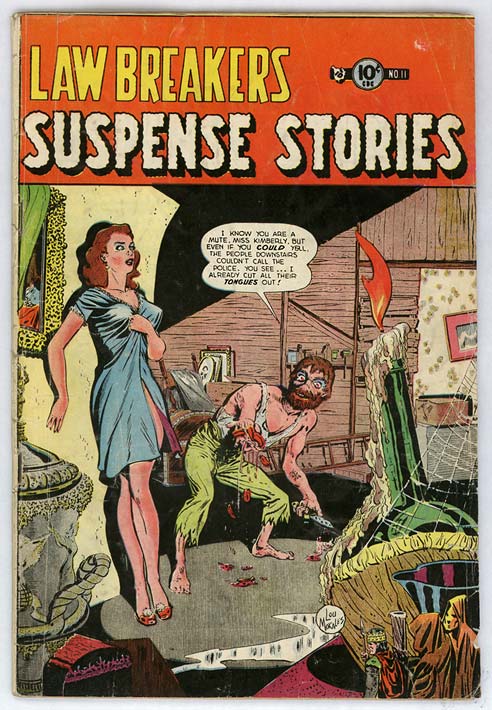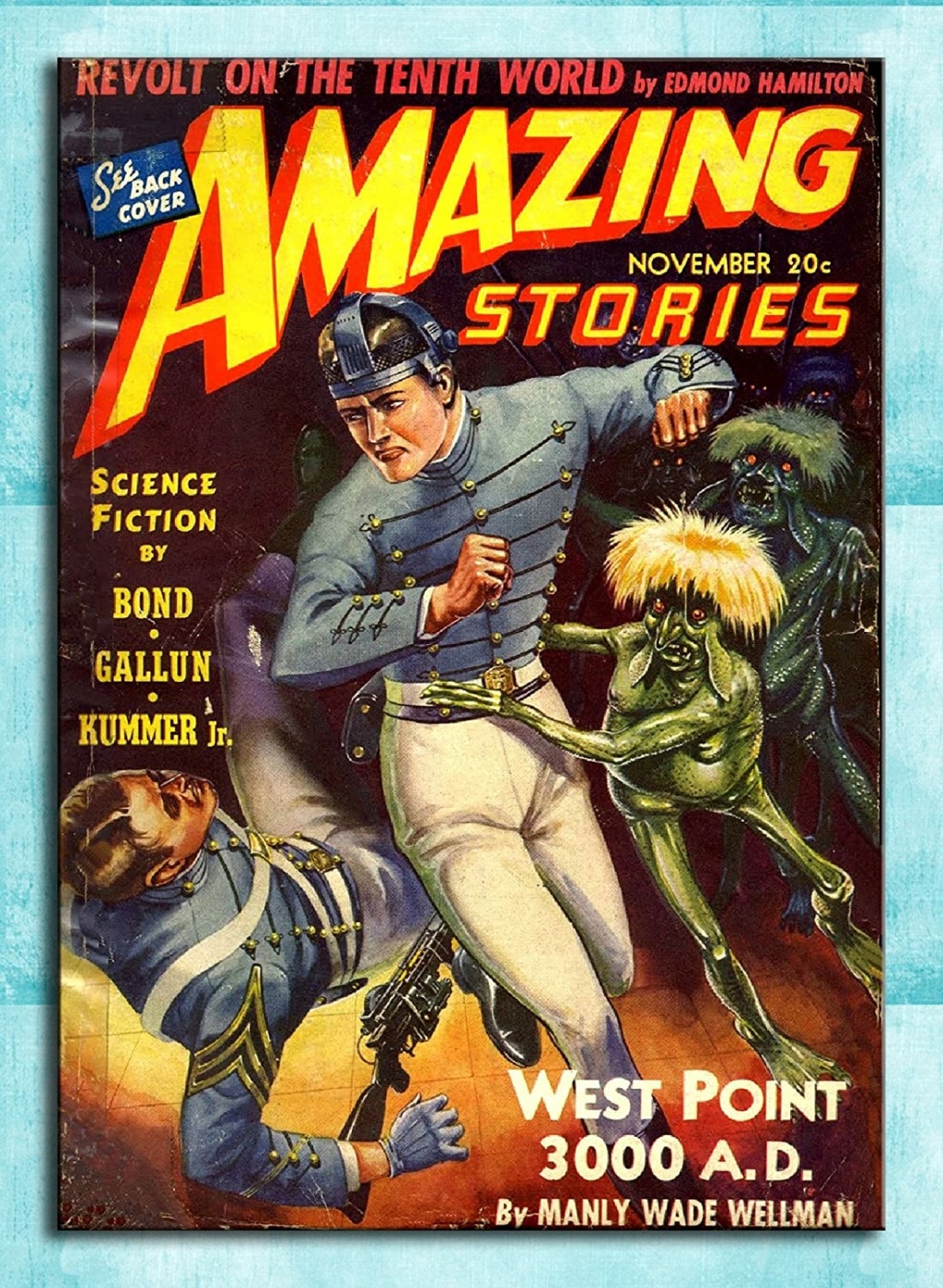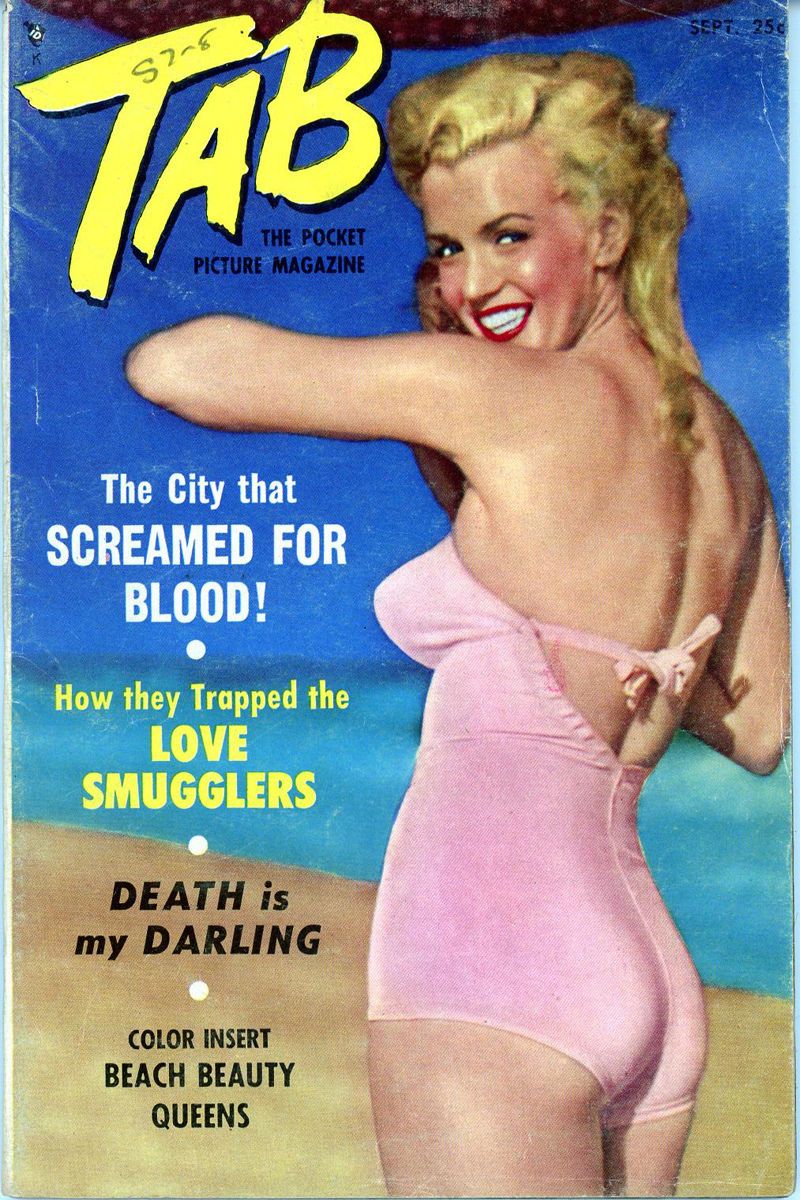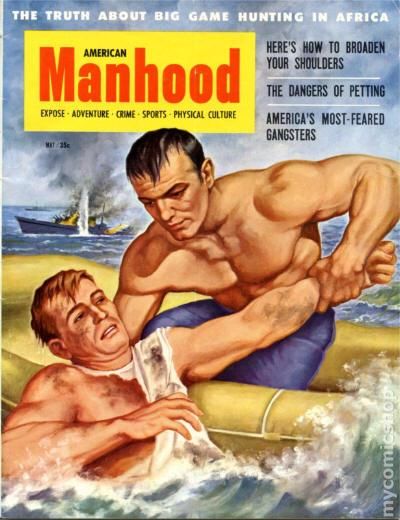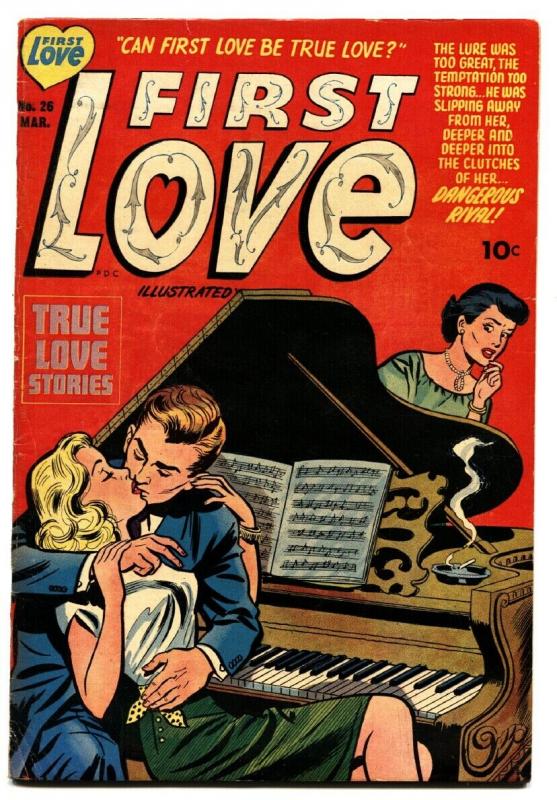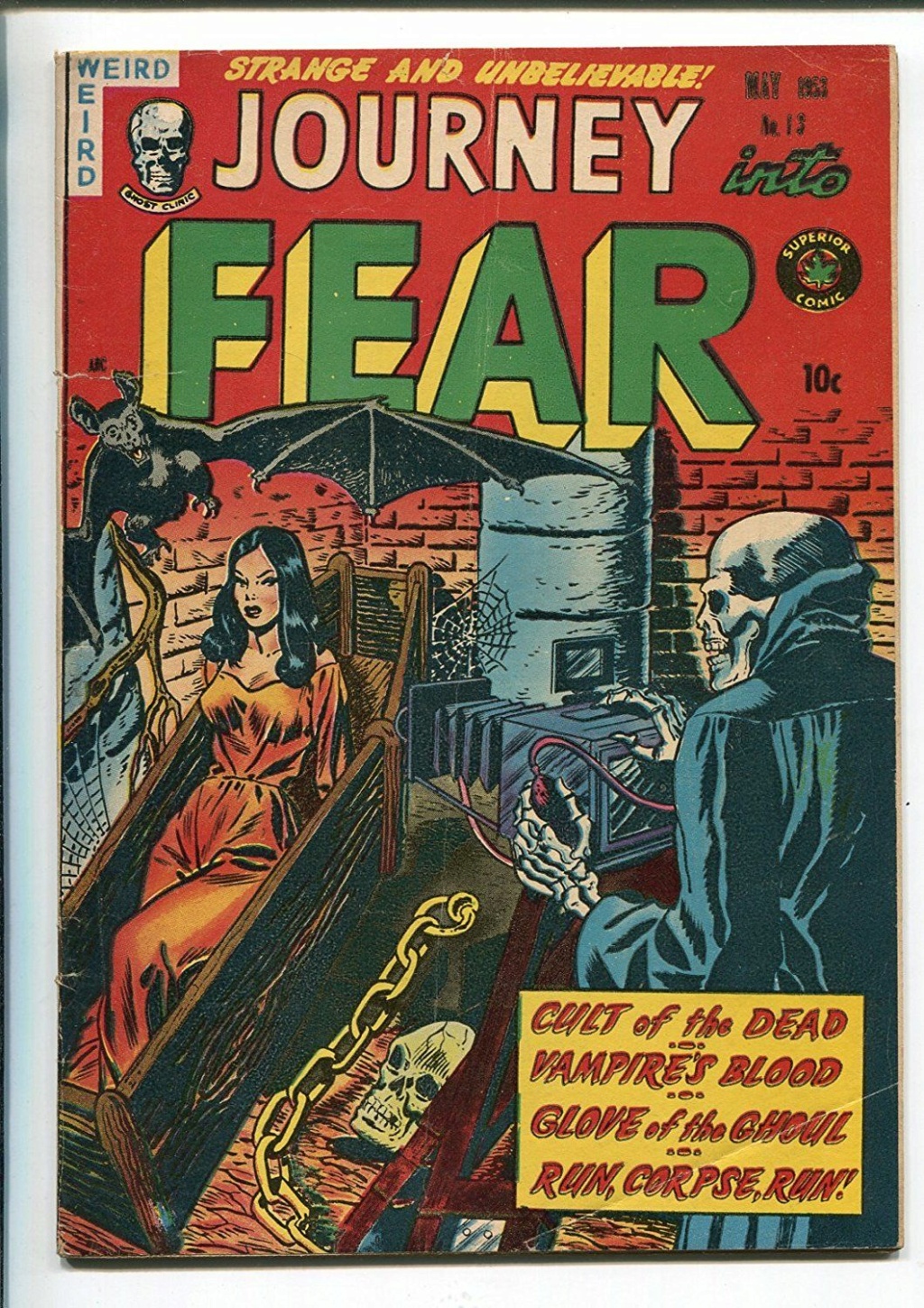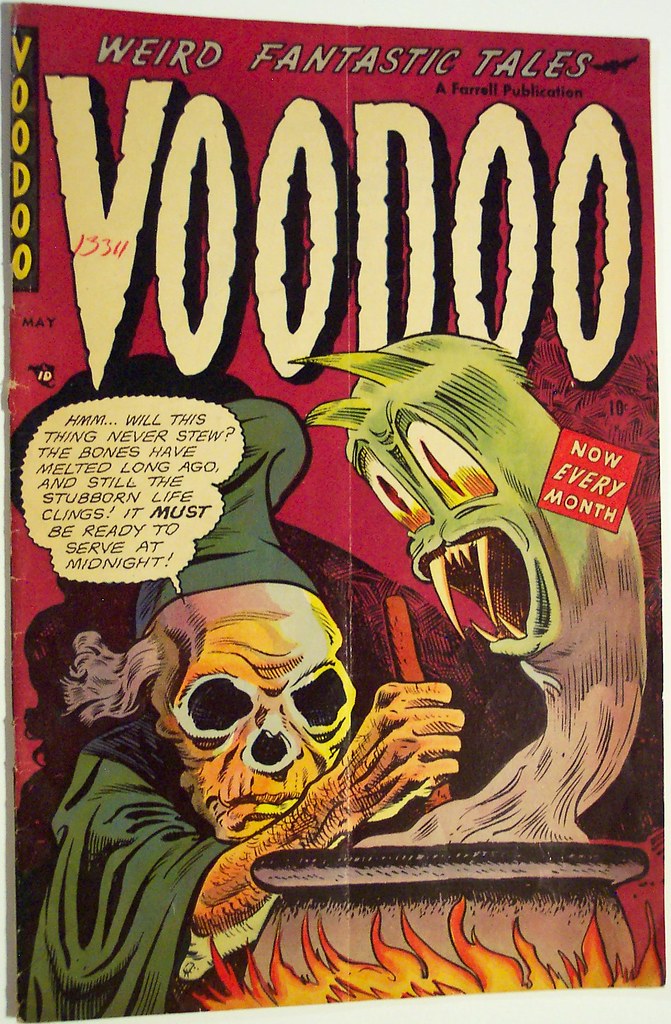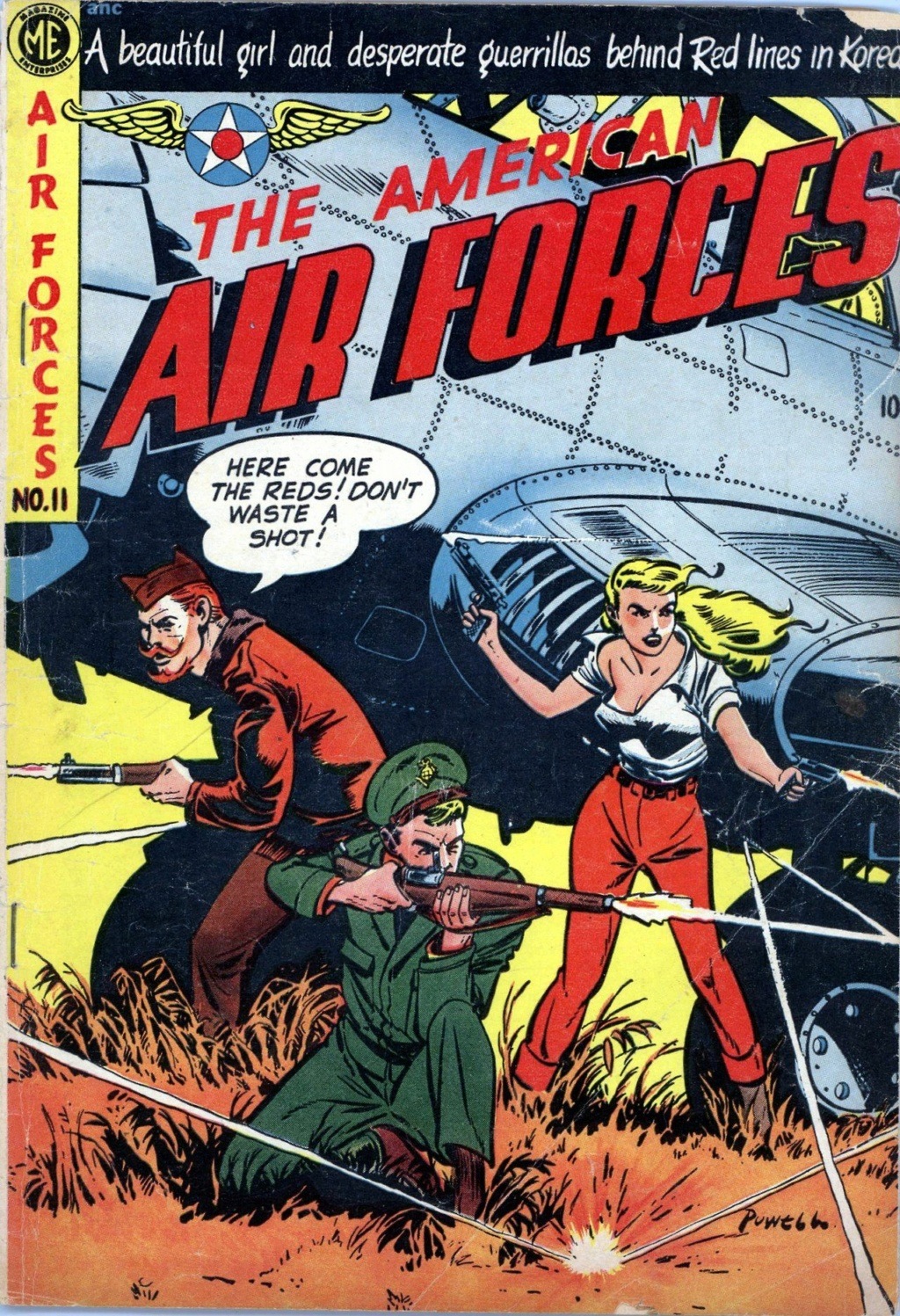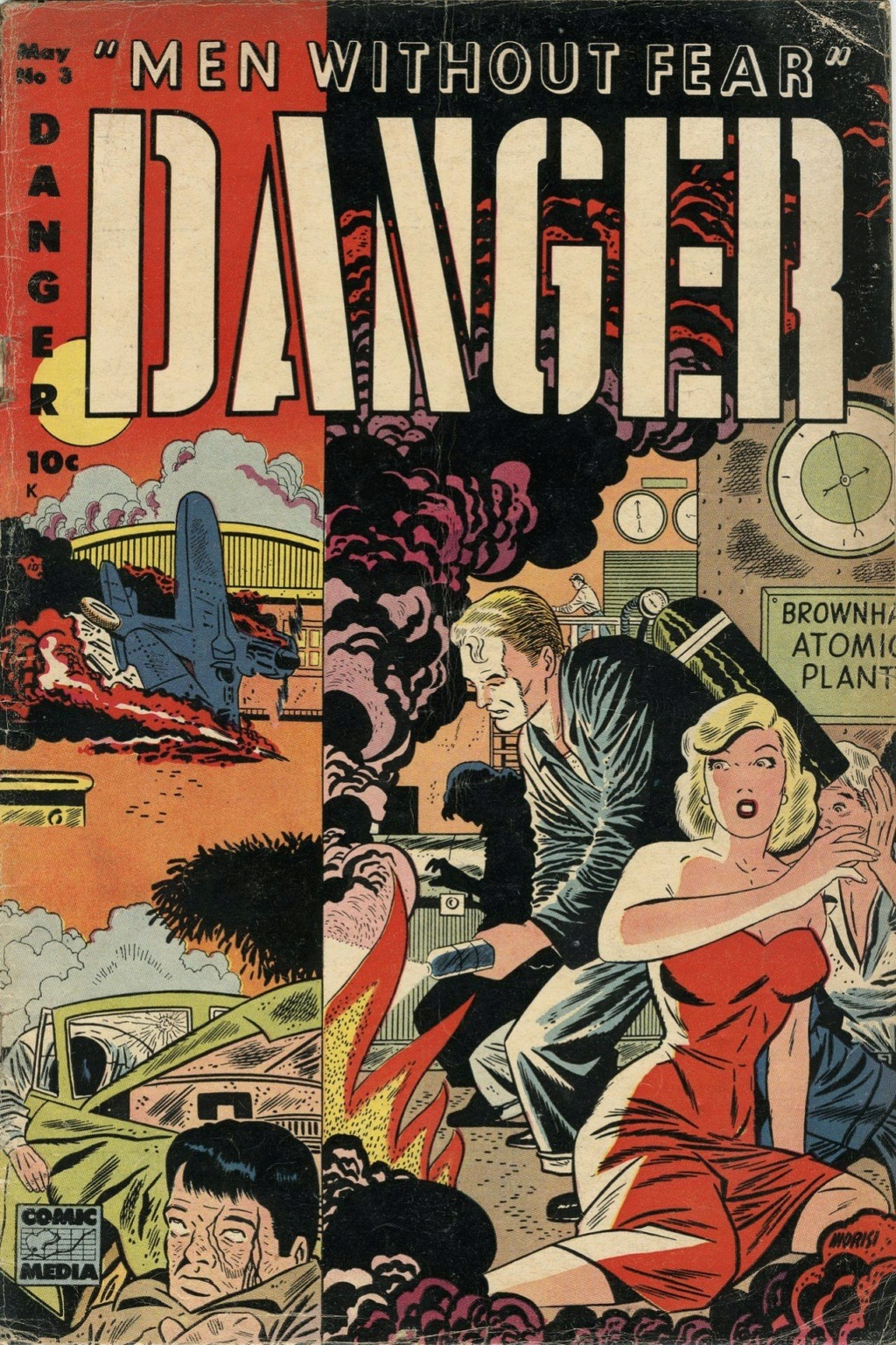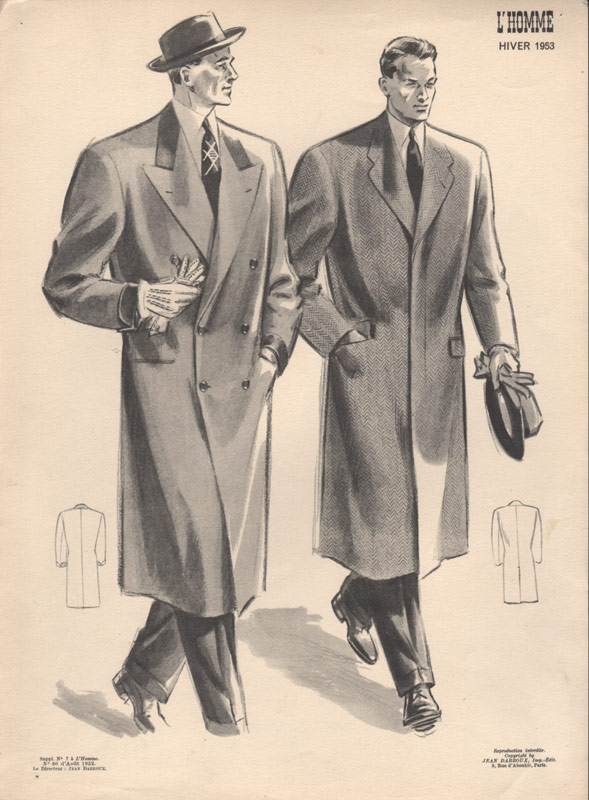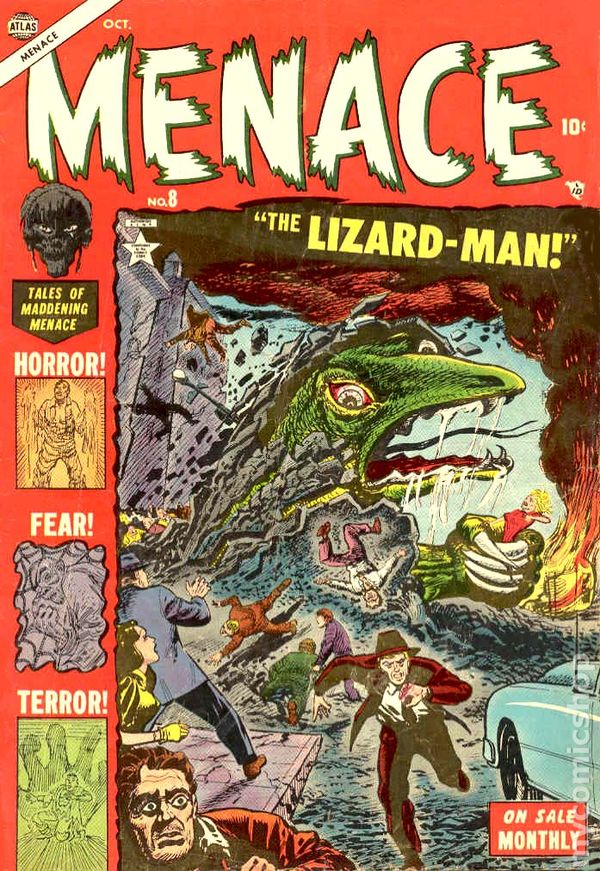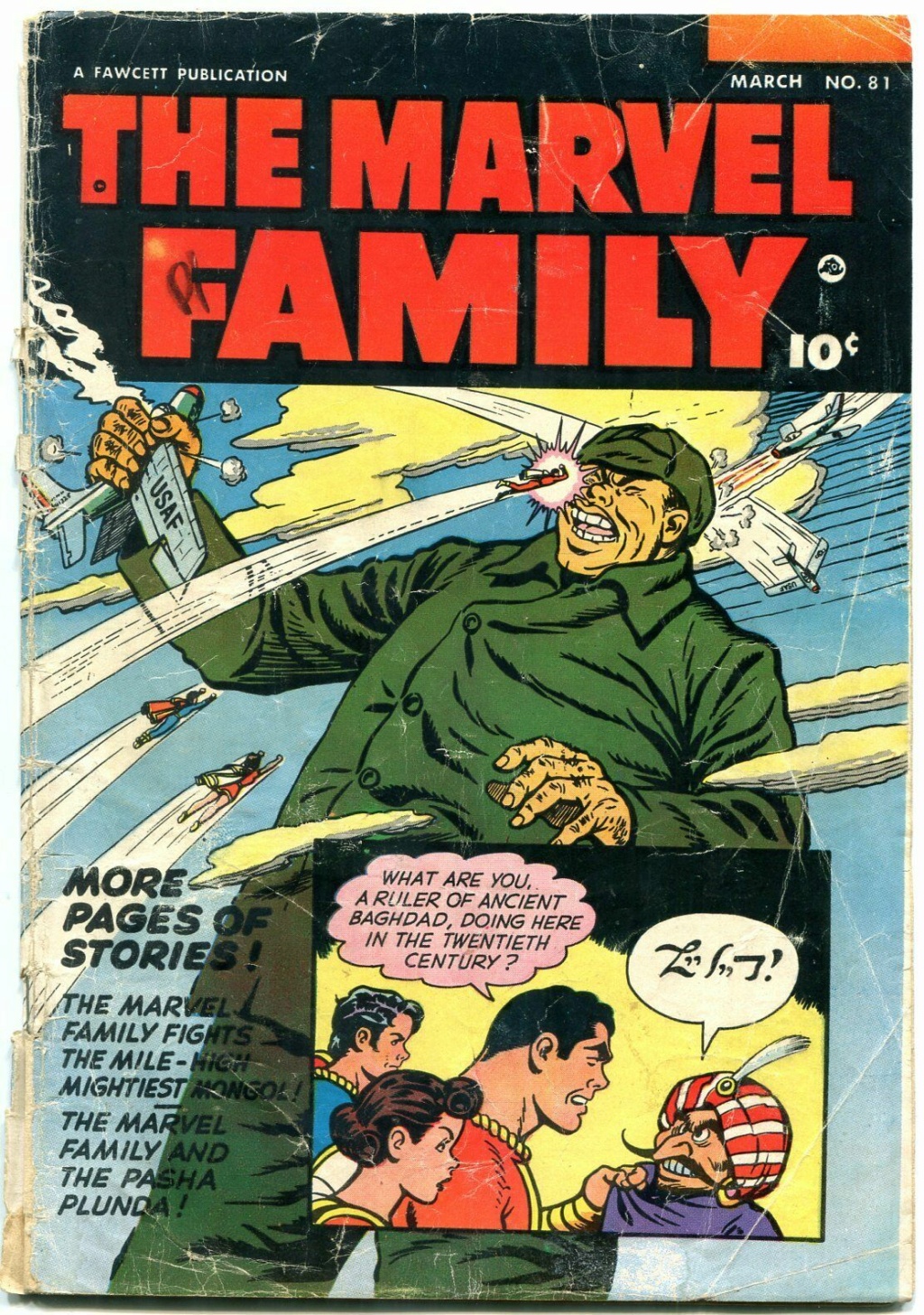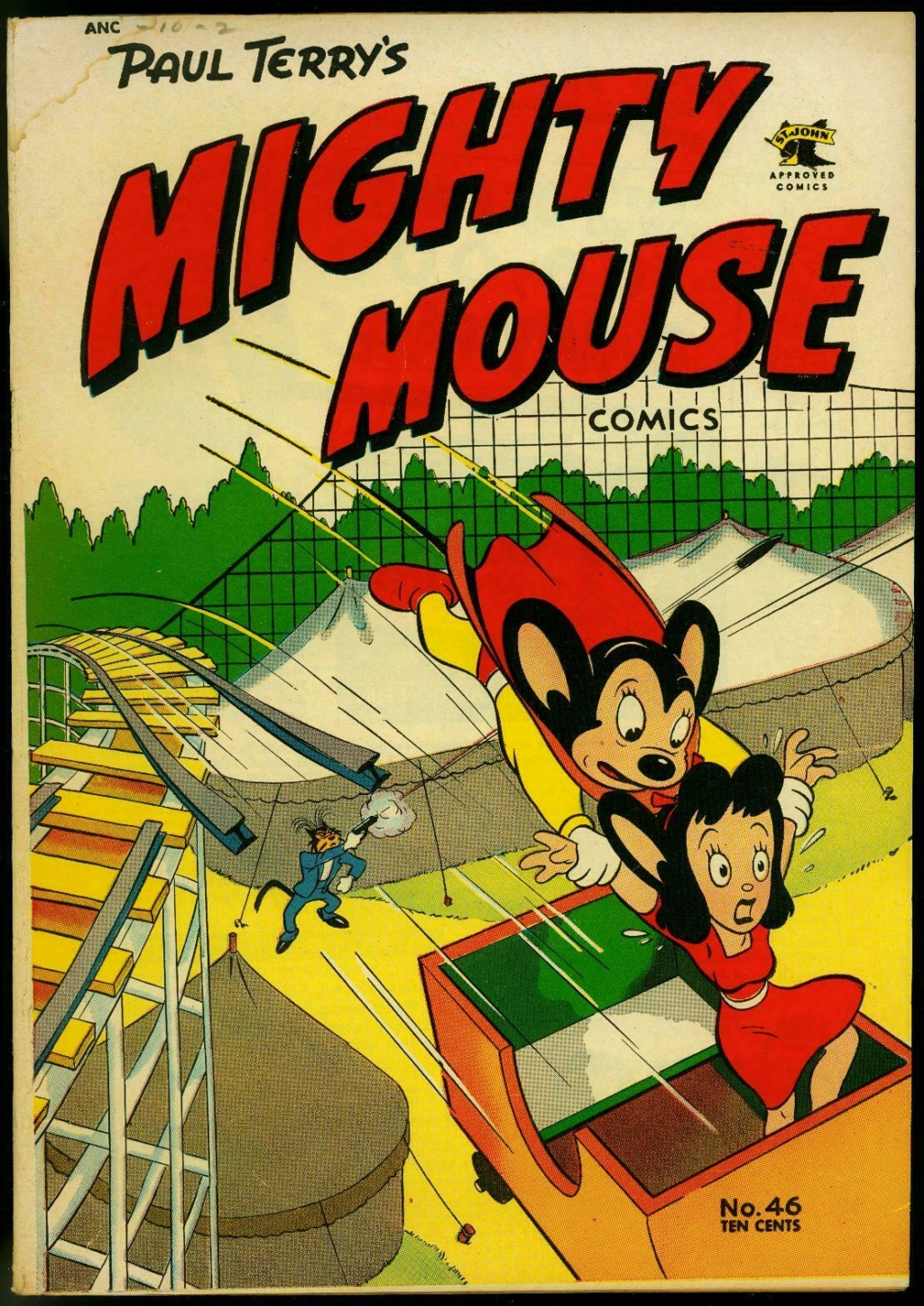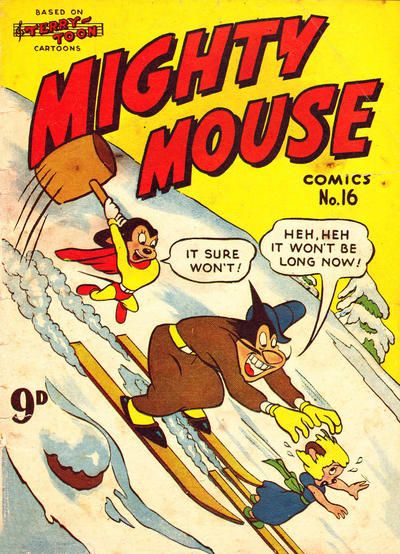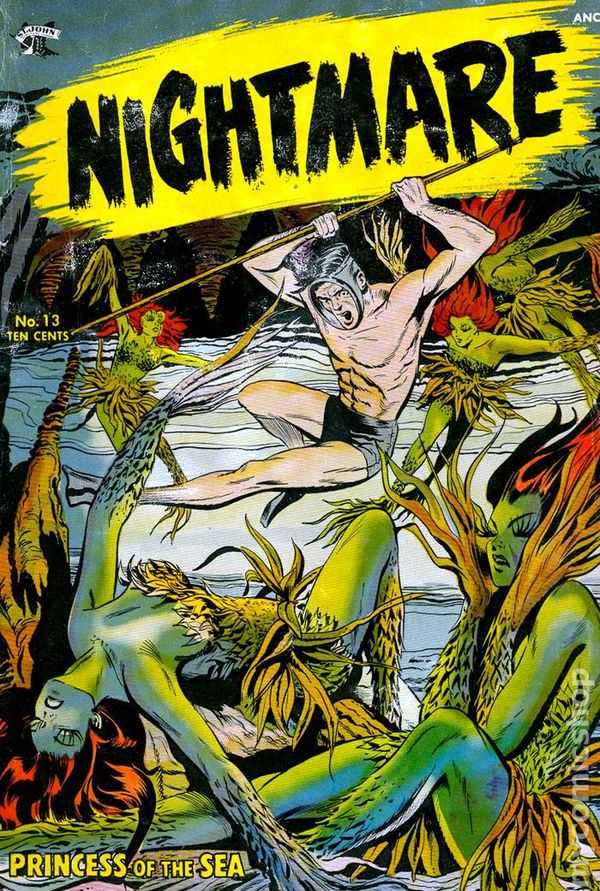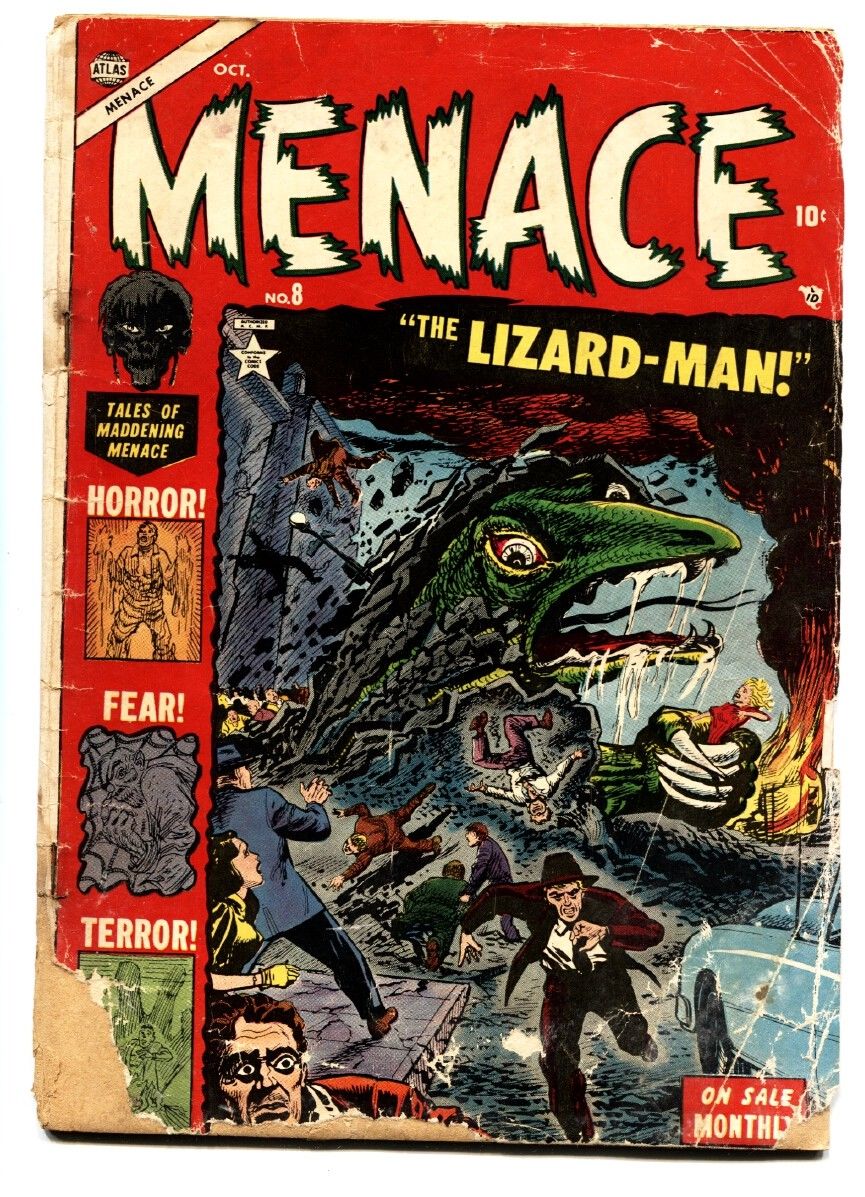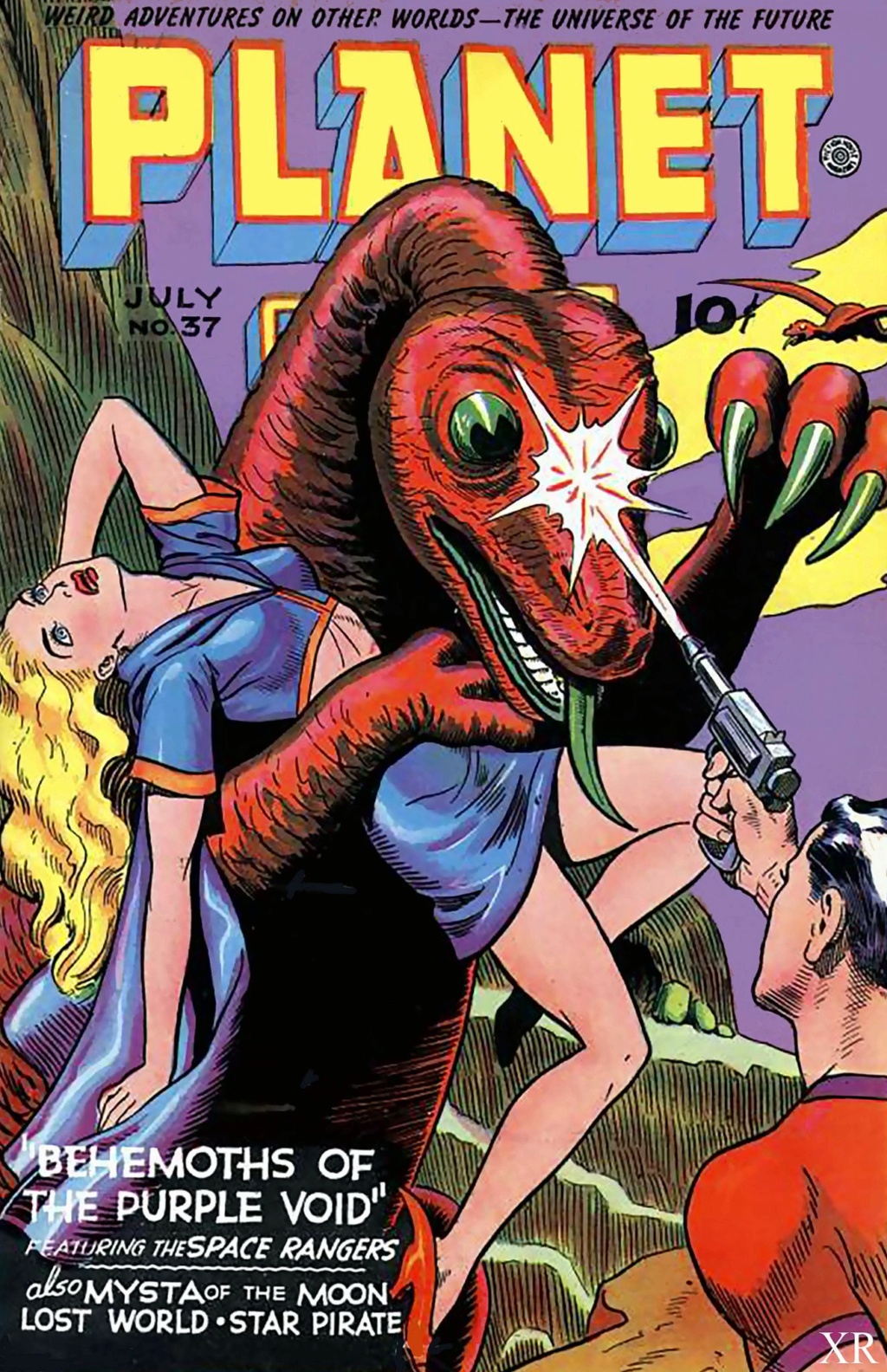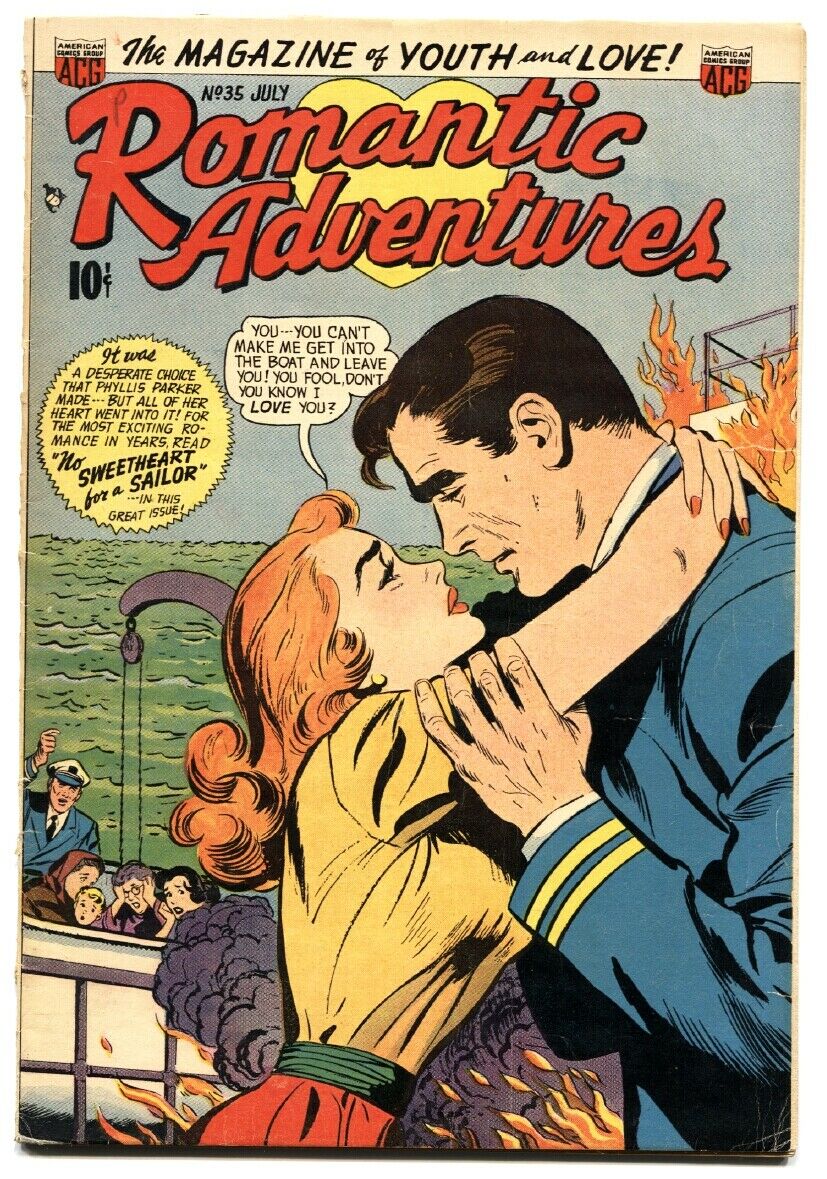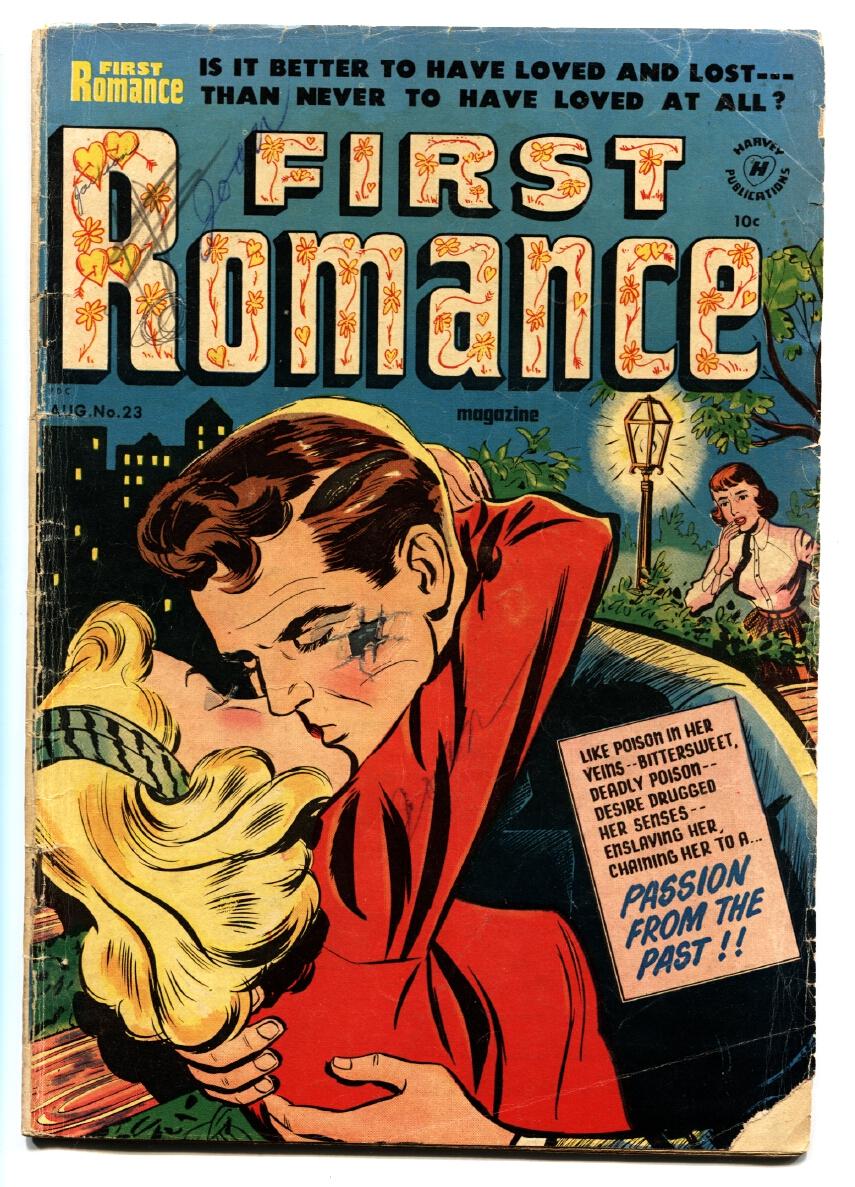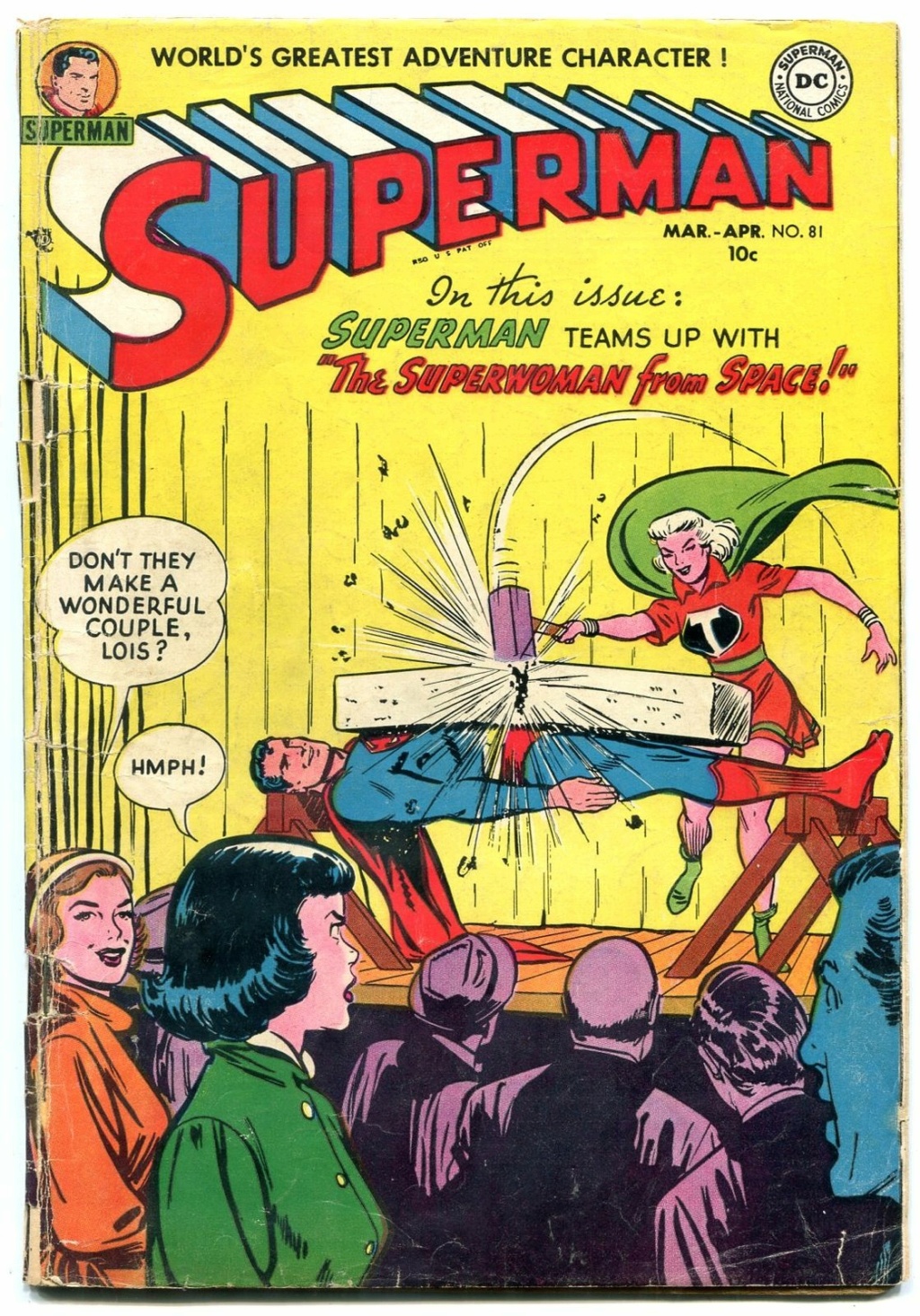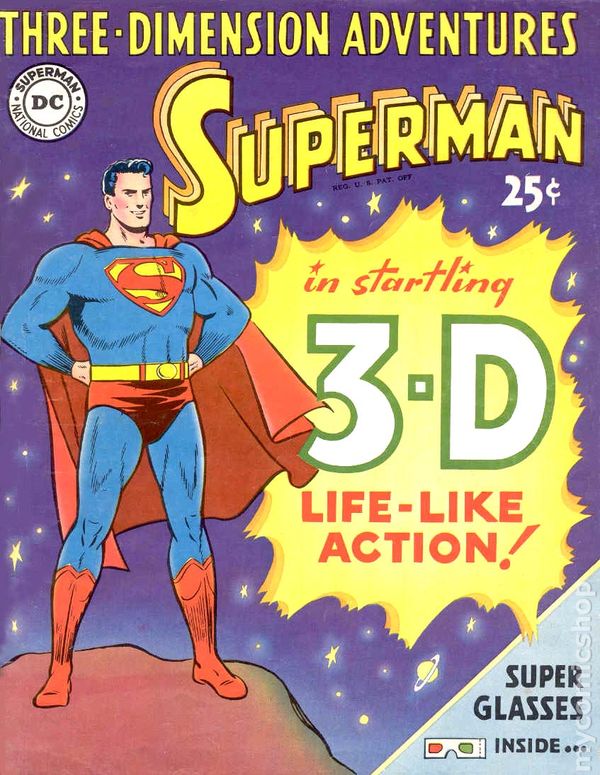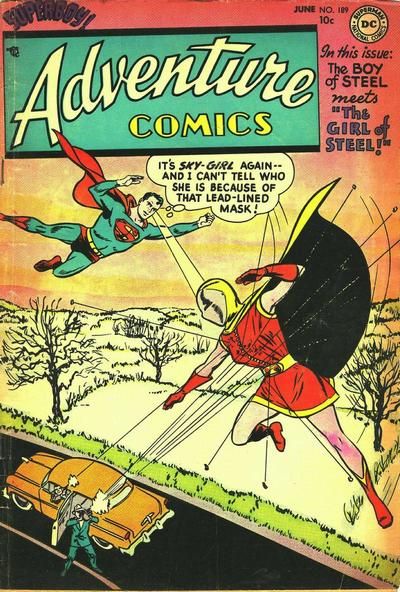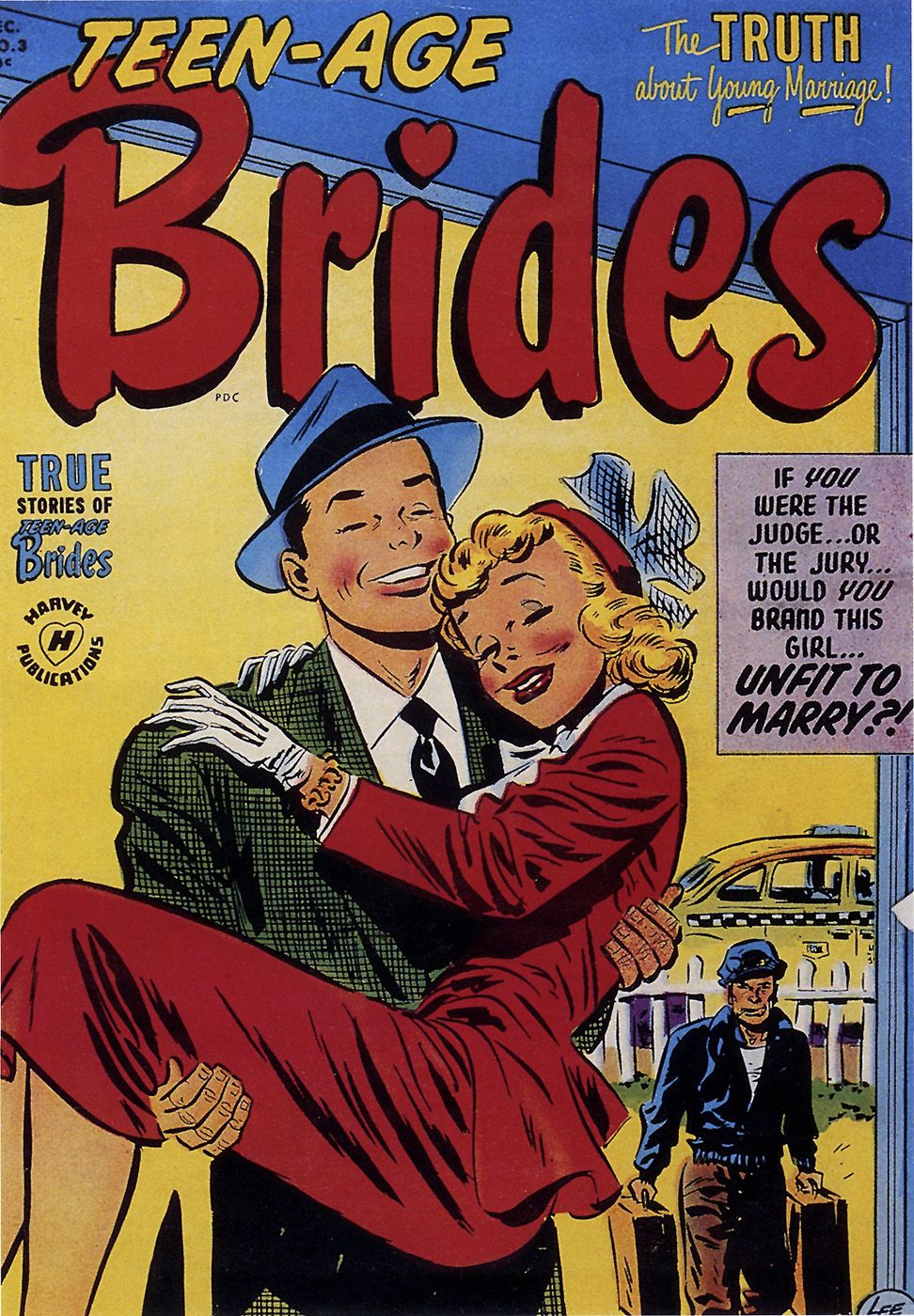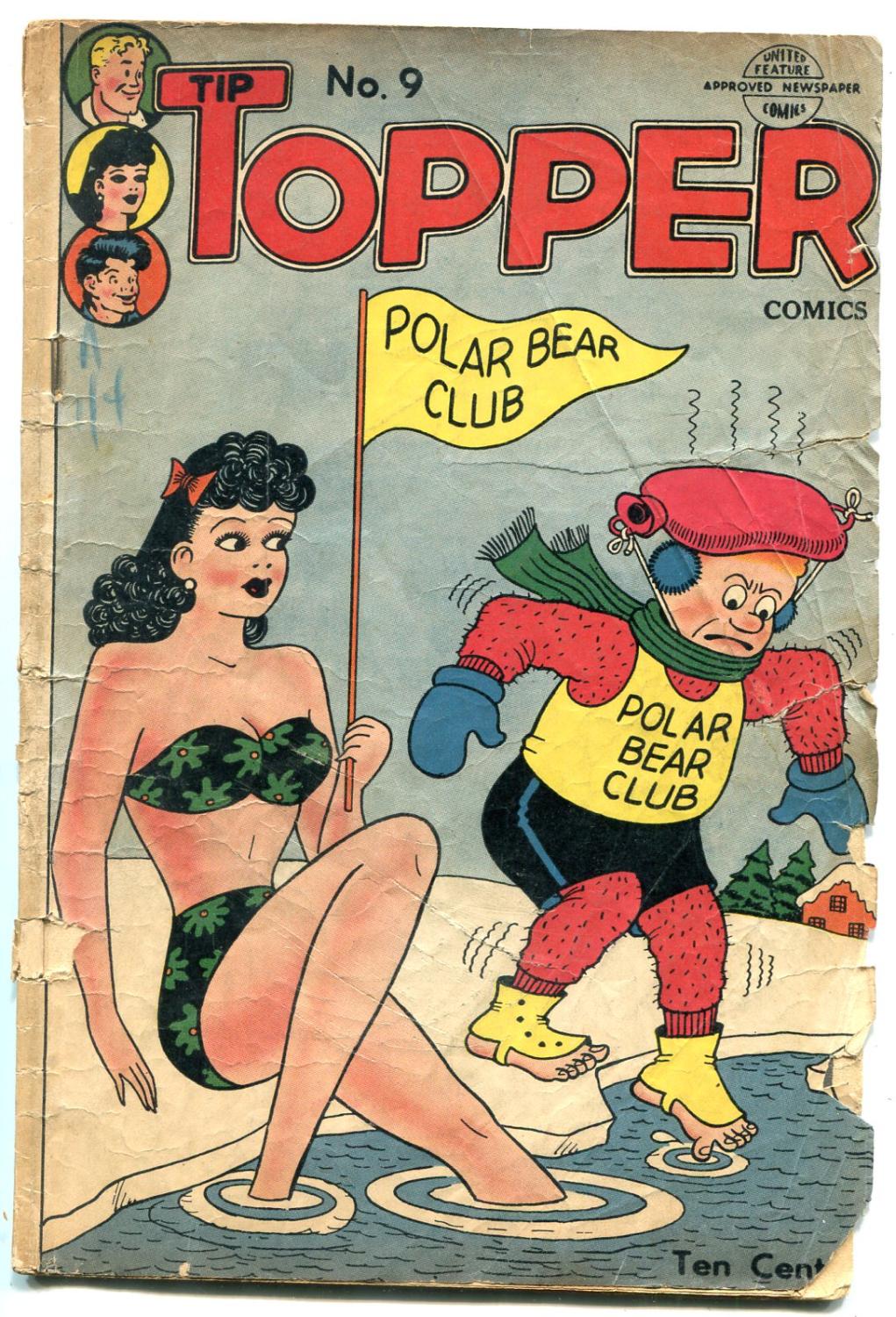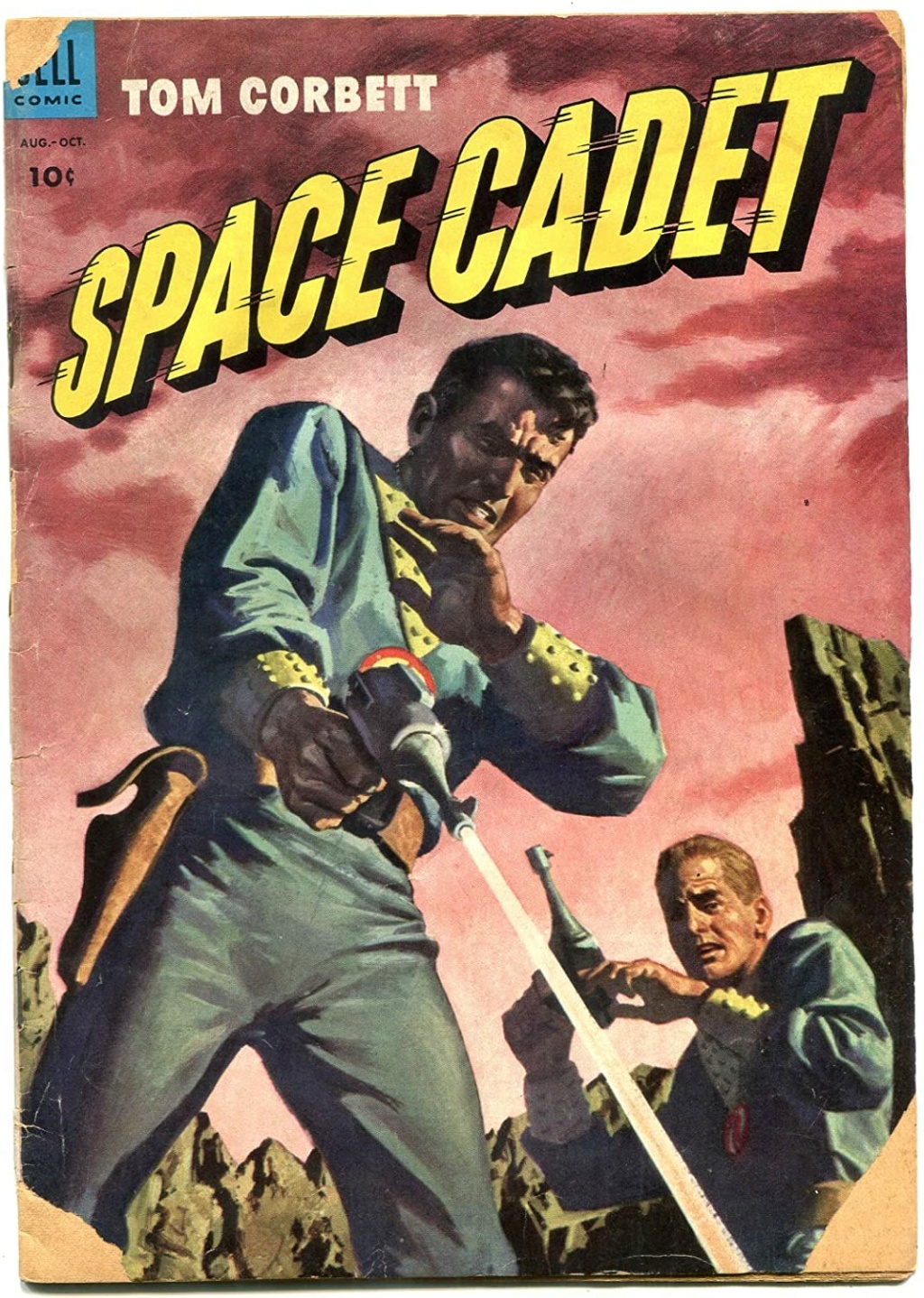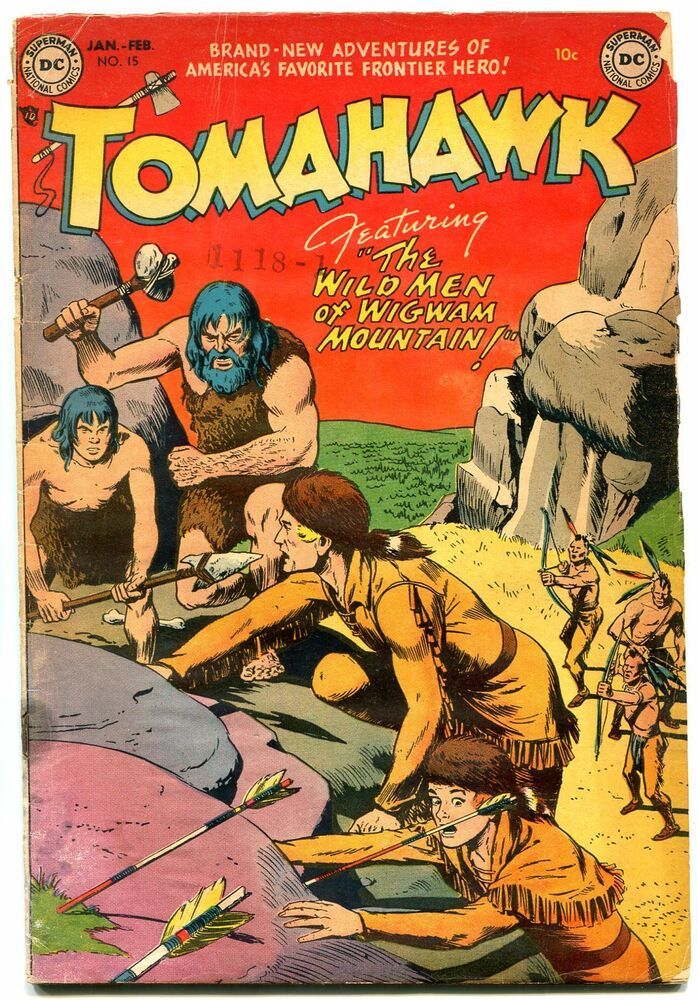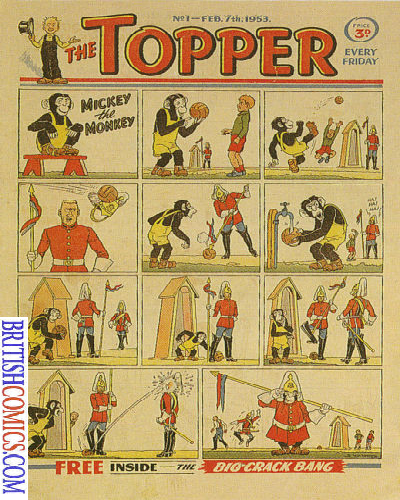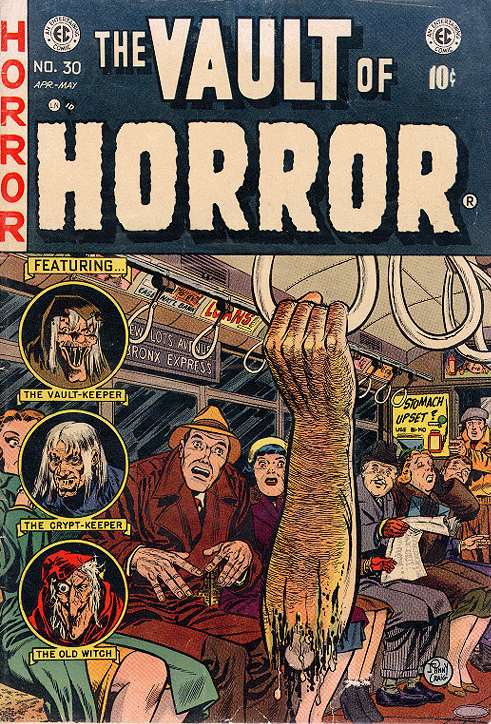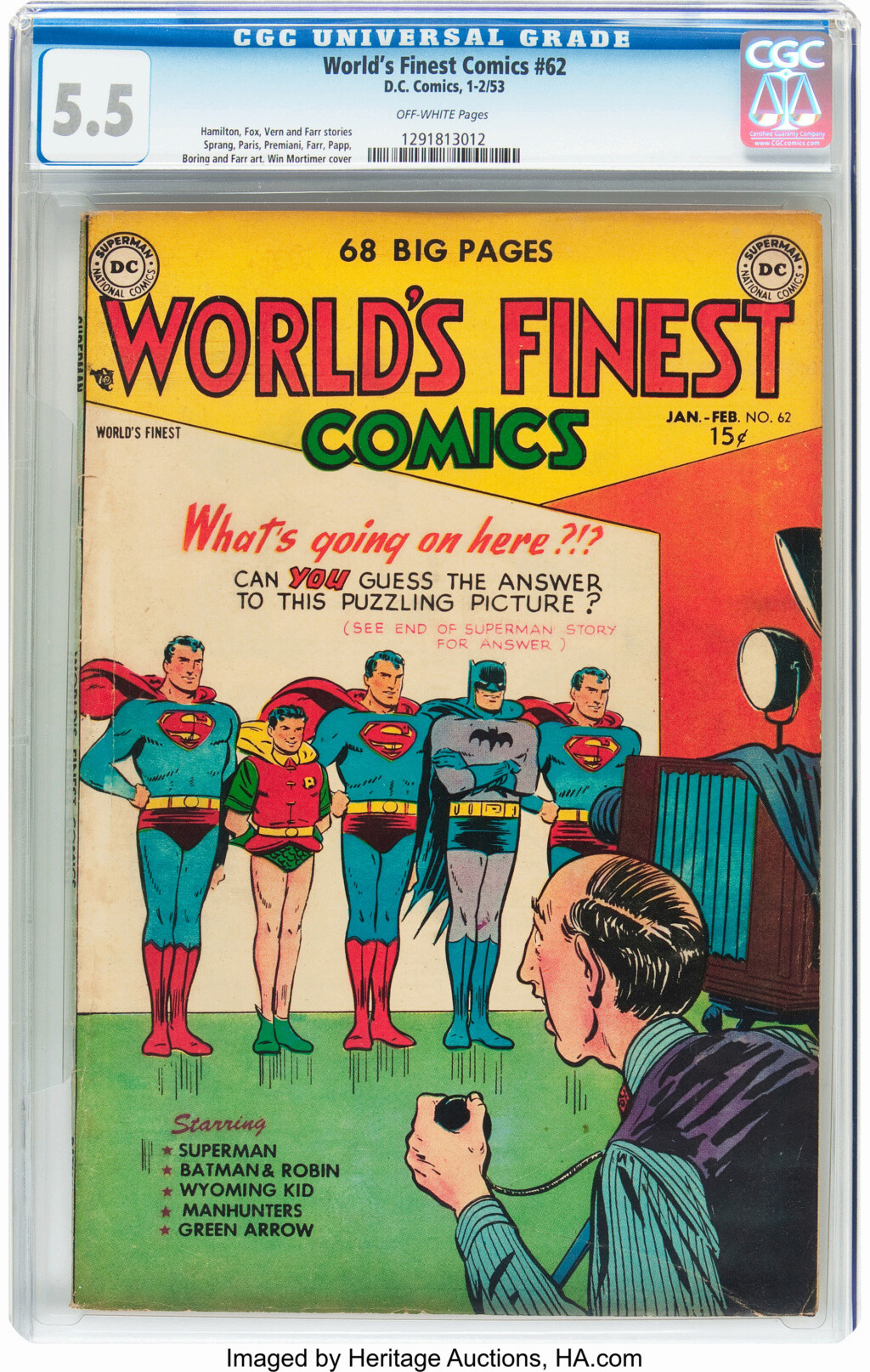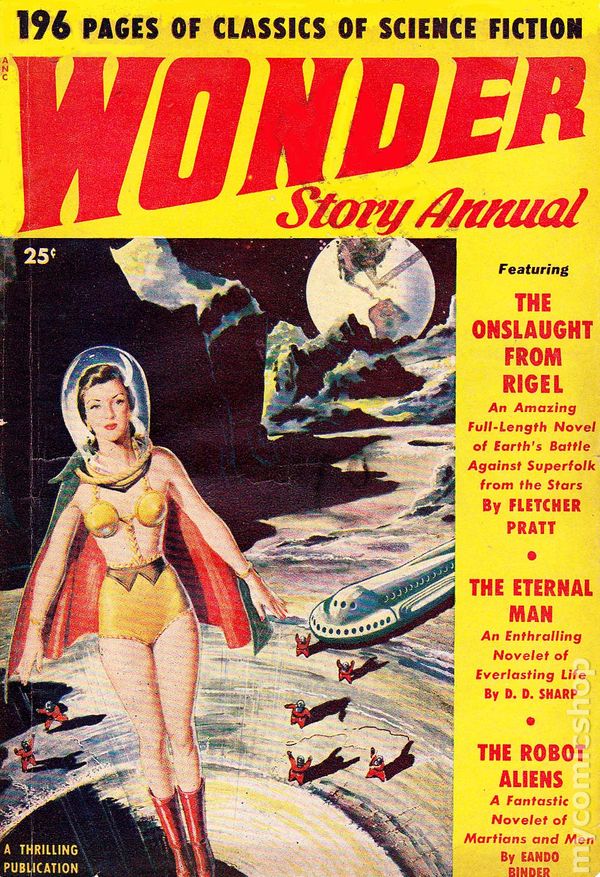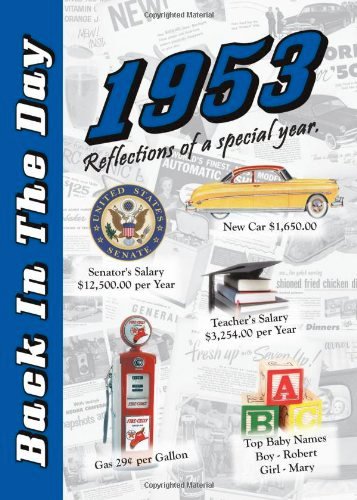1950s California
2 posters
Page 3 of 3 •  1, 2, 3
1, 2, 3

DavidMcMahon- Cosmic Level
- Posts : 8754
Join date : 2010-05-10
Age : 64
Location : Raleigh, NC, USA

DavidMcMahon- Cosmic Level
- Posts : 8754
Join date : 2010-05-10
Age : 64
Location : Raleigh, NC, USA
 Re: 1950s California
Re: 1950s California
HOWDY DOODY WAS A HUGE KIDS SHOW IN THE 1950s. I'VE SEEN A FEW EPISODES THAT SURVIVE. HOWDY AND MOST OF THE OTHER CHARACTERS ON THE SHOW, OUTSIDE OF BUFFALO BOB AND CLARENCE THE CLOWN WERE ALL PUPPETS. THE ORIGINAL CLARENCE THE CLOWN, BTW, WAS PLAYED BY THE MAN WHO WOULD GO ON TO BECOME A FAMOUS KID'S SHOW HOST IN THE 60S, CAPTAIN KANGAROO.
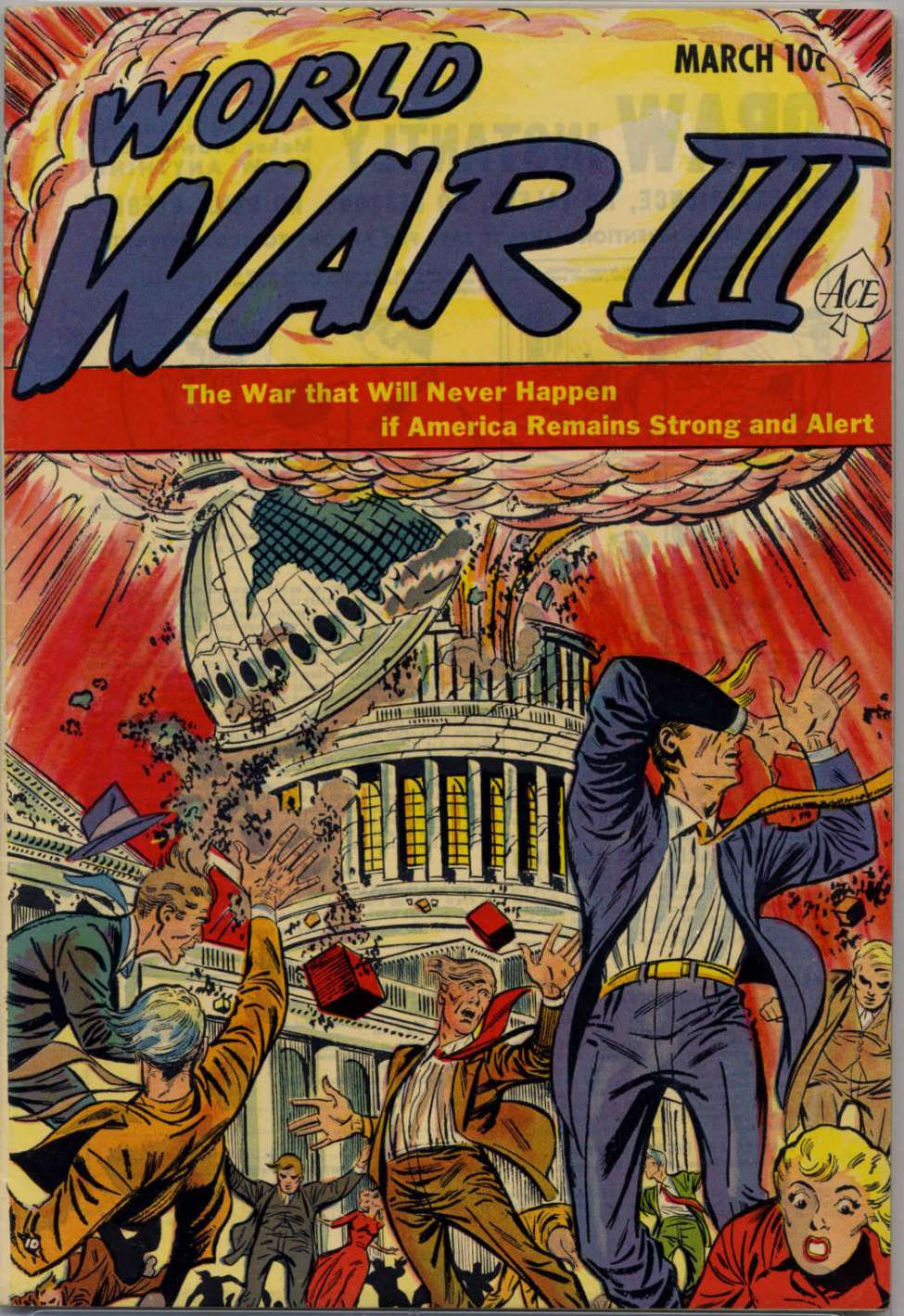
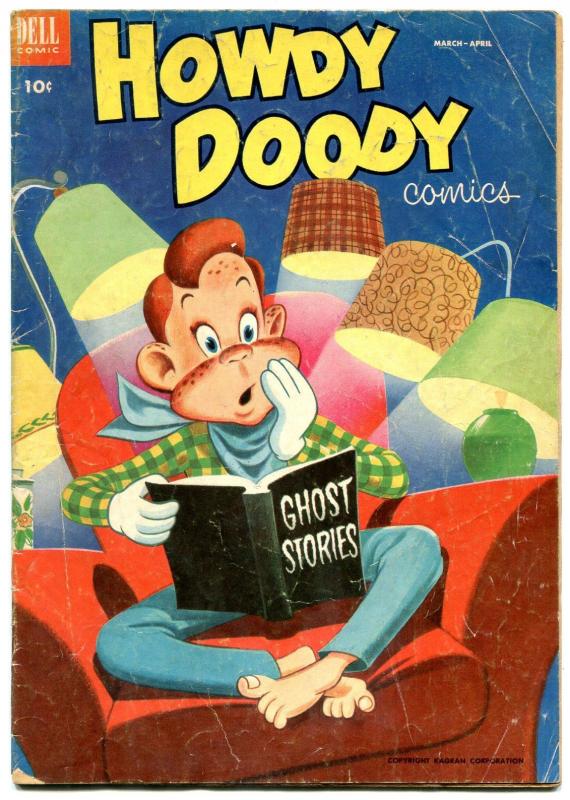
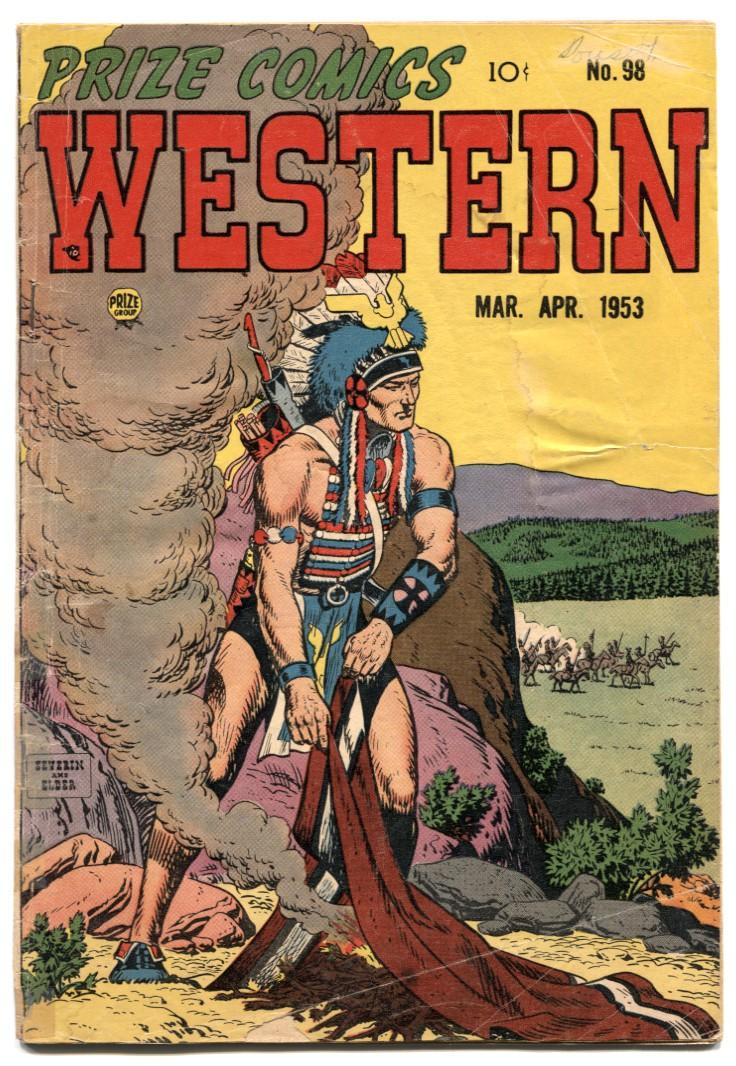




DavidMcMahon- Cosmic Level
- Posts : 8754
Join date : 2010-05-10
Age : 64
Location : Raleigh, NC, USA

DavidMcMahon- Cosmic Level
- Posts : 8754
Join date : 2010-05-10
Age : 64
Location : Raleigh, NC, USA

DavidMcMahon- Cosmic Level
- Posts : 8754
Join date : 2010-05-10
Age : 64
Location : Raleigh, NC, USA

DavidMcMahon- Cosmic Level
- Posts : 8754
Join date : 2010-05-10
Age : 64
Location : Raleigh, NC, USA

DavidMcMahon- Cosmic Level
- Posts : 8754
Join date : 2010-05-10
Age : 64
Location : Raleigh, NC, USA

DavidMcMahon- Cosmic Level
- Posts : 8754
Join date : 2010-05-10
Age : 64
Location : Raleigh, NC, USA
 Re: 1950s California
Re: 1950s California

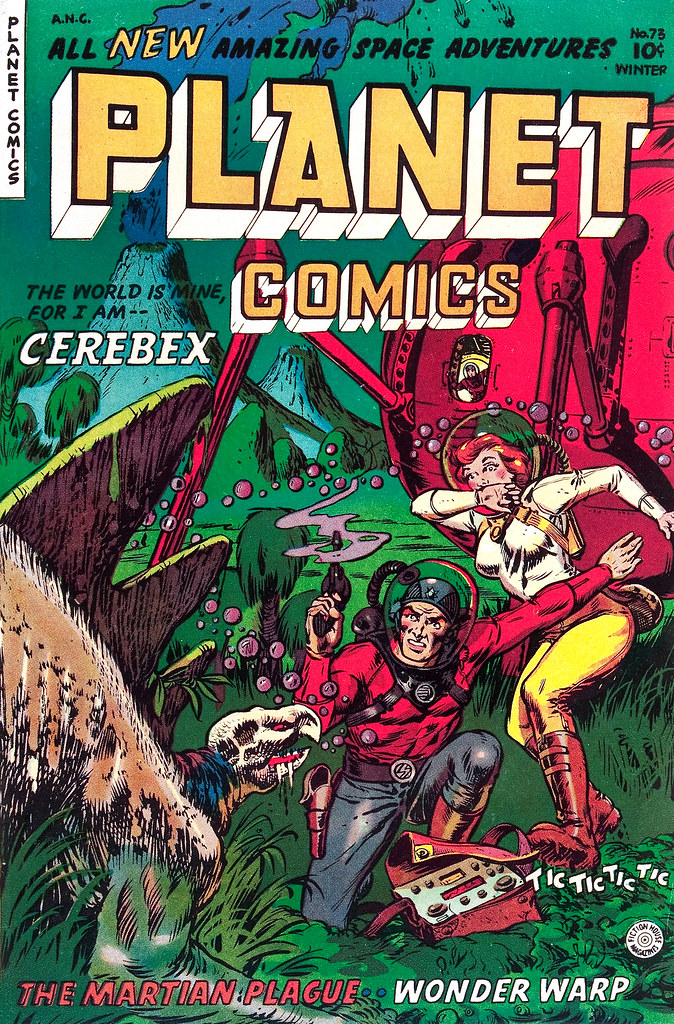
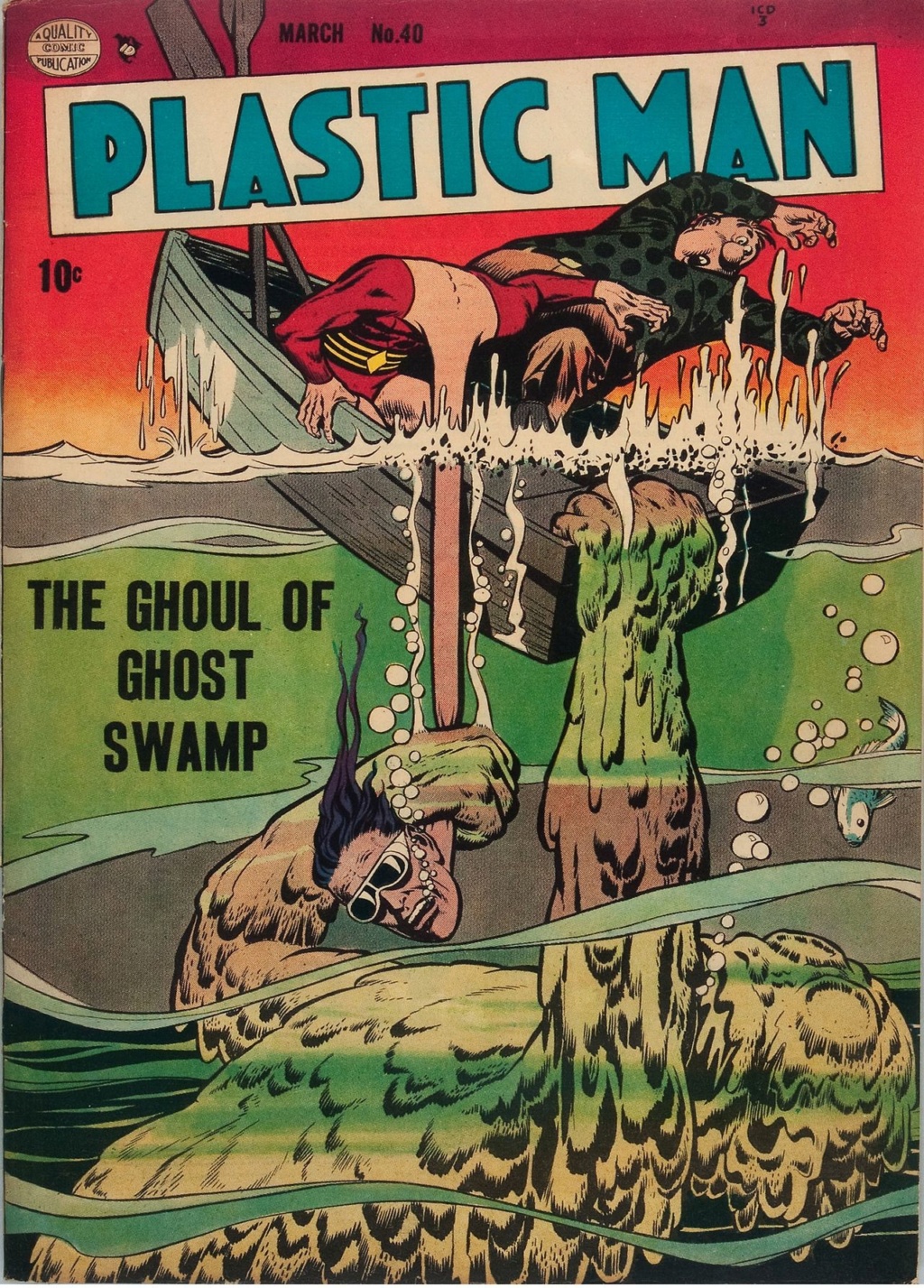
PLASTIC MAN HAD QUITE A NUMBER OF HORROR STORIES EVEN BEFORE THE 1950s HORROR CRAZE, THEY JUST NEVER MADE IT TO THE COVERS BEFORE THEN.
JACK COLE:
Career
Early work
In 1936, having married childhood sweetheart Dorothy Mahoney soon after graduating high school, Cole moved with his wife to New York City's Greenwich Village. After spending a year attempting to break in as a magazine/newspaper illustrator, Cole began drawing for the studio of the Harry "A" Chesler, one of the first comic-book "packagers" who supplied outsourced stories to publishers entering the new medium. There, Cole drew such features as "TNT Todd of the FBI" and "Little Dynamite" for Centaur Publications comics such as Funny Pages and Keen Detective Funnies. He produced such additional features as "King Kole's Kourt" (under the pseudonym Geo. Nagle), "Officer Clancy", and "Peewee Throttle" (under the pseudonym Ralph Johns), and "Ima Slooth."Golden Age of Comic Books
 | This section, except for one footnote, needs additional citations for verification. Please help improve this article by adding citations to reliable sources. Unsourced material may be challenged and removed. Find sources: "Jack Cole" artist – news · newspapers · books · scholar · JSTOR (April 2014) (Learn how and when to remove this template message) |
After becoming an editor at Lev Gleason and revamping Jack Binder's original Golden Age Daredevil in 1940, Cole was hired at Quality Comics. He worked with Will Eisner, assisting on the writer-artist's signature hero The Spirit—a masked crime-fighter created for a weekly syndicated newspaper Sunday supplement and reprinted in Quality Comics. At the behest of Quality publisher Everett "Busy" Arnold, Cole later created his own satiric, Spirit-style hero, Midnight, for Smash Comics No. 18 (Jan. 1941). Midnight, the alter ego of radio announcer Dave Clark, wore a similar fedora hat and domino mask, and partnered with a talking monkey—questionably in place of the Spirit's young African-American sidekick, Ebony White.[5] During Eisner's World War II military service, Cole and Lou Fine were the primary Spirit ghost artists; their stories were reprinted in DC Comics' hardcover collections The Spirit Archives Vols. 5 to 9 (2001–2003), spanning July 1942 – Dec. 1944. In addition, Cole continued to draw one and two-page filler pieces, sometimes under the pseudonym Ralph Johns, and a memorable autobiographical appearance in "Inki," which appeared in Crack Comics #34.[6]
Plastic Man
Main article: Plastic Man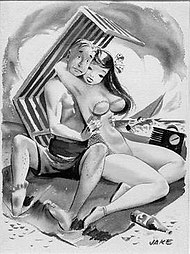
Sample of Cole's original art for Humorama
Cole created Plastic Man for a backup feature in Quality's Police Comics #1 (Aug. 1941). While Timely Comics' quickly forgotten Flexo the Rubber Man had preceded "Plas" as comics' first stretching hero, Cole's character became an immediate hit, and Police Comics' lead feature with issue #5. As well, Cole's offbeat humor, combined with Plastic Man's ability to take any shape, gave the cartoonist opportunities to experiment with text and graphics in groundbreaking manner—helping to define the medium's visual vocabulary[citation needed], and making the idiosyncratic character one of the few to endure from the Golden Age to modern times. Plastic Man gained his own title in 1943.
By the decade's end, however, Cole's feature was being created entirely by anonymous ghost writers and artists—including Alex Kotzky[citation needed] and John Spranger[citation needed]—despite Cole's name being bannered. One last stint by Cole himself in 1949 and 1950 could not save the title. Plastic Man was cancelled in 1956 after several years of reprinting the Cole material, and new stories by others.
Additionally, Cole and writer Joe Millard created the lighthearted feature "The Barker", starring carnival barker Carnie Callhan. Introduced in National Comics #42 (May, 1944), the feature spun off into a 15-issue comic of its own (Autumn 1946 - Dec. 1949)[7]
Playboy
 | This section, except for one quote with two footnotes for it, needs additional citations for verification. Please help improve this article by adding citations to reliable sources. Unsourced material may be challenged and removed. Find sources: "Jack Cole" artist – news · newspapers · books · scholar · JSTOR (April 2014) (Learn how and when to remove this template message) |
Betsy and Me
Main article: Betsy and MeIn 1958, Cole created his own daily newspaper comic strip, Betsy and Me, which he sold to the Chicago Sun-Times Syndicate.[11] The strip began on May 26 and chronicled the domestic adventures of nebbishy Chester Tibbet as narrator, his wife Betsy, and their 5-year-old genius son, Farley.[11] For it, Cole utilized "a simplified style," historian Ron Goulart wrote, "reminiscent of the drawing in the UPA animated cartoons."[12] Betsy and Me ran for two-and-a-half months before Cole's self-inflicted death; his last daily was published on September 6 and his last Sunday on September 14. In the final Cole daily, Betsy and Chester are seen signing up for a brand-new tract house in Sunken Hills.[12] The syndicate hire advertising artist Dwight Parks, who had been trying to sell his own strip about a philosophical hobo.[13]
Death
On August 13, 1958, Cole got in his Chevy station wagon, purchased a rifle, and fatally shot himself in the head. On the day he died, Cole mailed a suicide note explaining the reasons for his suicide to his wife Dorothy. The coroner deemed that letter too personal and did not enter it as evidence at the ensuing inquest. The only explanation Dorothy Cole publicly gave was "We had had an argument before." She subsequently remarried, and disappeared from public view. Cole also wrote a suicide note to his editor and father figure, Hugh Hefner, which was printed in Art Spiegelman's biography of Cole, Jack Cole & Plastic Man: Forms Stretched To Their Limits. The note reads:"Dear Hef, When you read this I shall be dead. I cannot go on living with myself and hurting those dear to me. What I do has nothing to do with you."
Gravett notes that while Cole owed Hefner money, his estate would cover this debt. Cole did not participate in the Playboy lifestyle, though the evening before his suicide, he did drink a substantial amount at a Playboy office party.[14]
The reason why the 43-year-old Cole killed himself remains one of the greatest mysteries in 20th Century American cartooning, according to journalist Paul Gravett. [14][15] Cole was in the prime of a celebrated cartooning career, complete with praise for his sophisticated gag cartoons in Playboy, and gaining increasing visibility for his newspaper strip Betsy and Me, R. C. Harvey described the suicide as "one of the most baffling events in the history of cartooning".[16]

DavidMcMahon- Cosmic Level
- Posts : 8754
Join date : 2010-05-10
Age : 64
Location : Raleigh, NC, USA
 Re: 1950s California
Re: 1950s California
IT IS PROBABLY DUE TO REX THE WONDER DOG THAT SUPERBOY GOT HIMSELF HIS OWN SUPER DOG, KRYPTO, WHICH SPUN OFF LOTS OF OTHER SUPER PETS THAT EVEN FORMED THEIR OWN LEGION OF SUPER-PETS. I THINK REX EVEN TOOK OVER THE LAST FEW COVERS OF GREEN LANTERN'S MAGAZINE. HE WAS OBVIOUSLY BASED OFF OF THE SILENT SCREEN DOG STAR, RIN TIN TIN. WHO CAME BEFORE LASSIE.
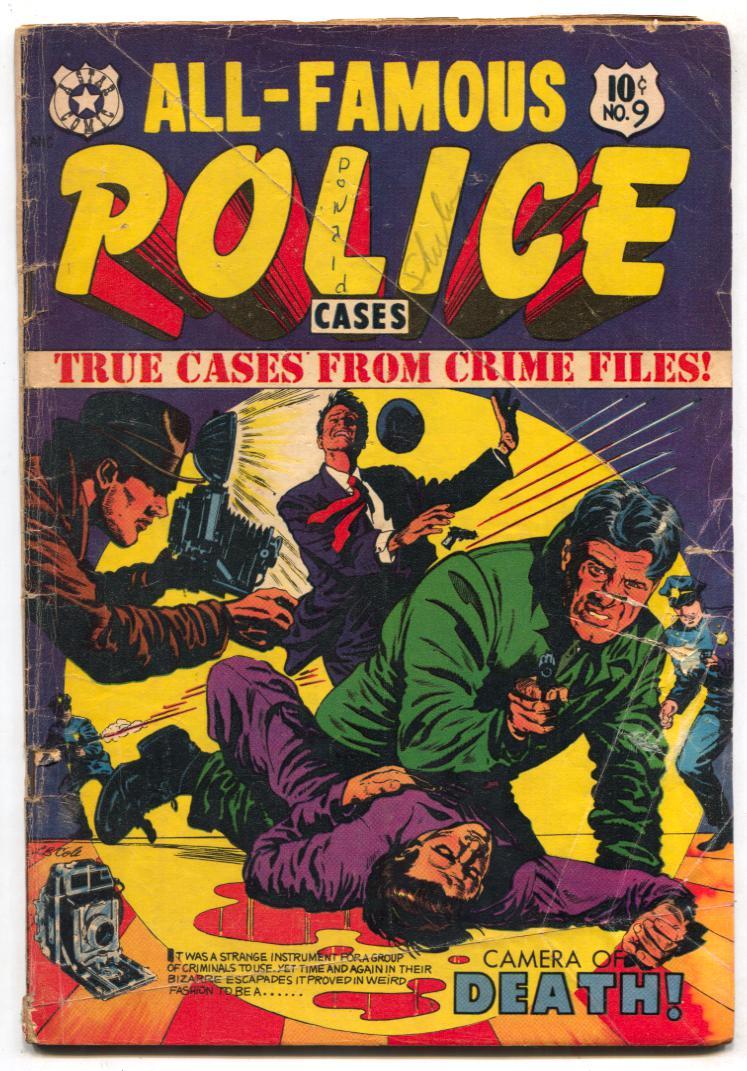

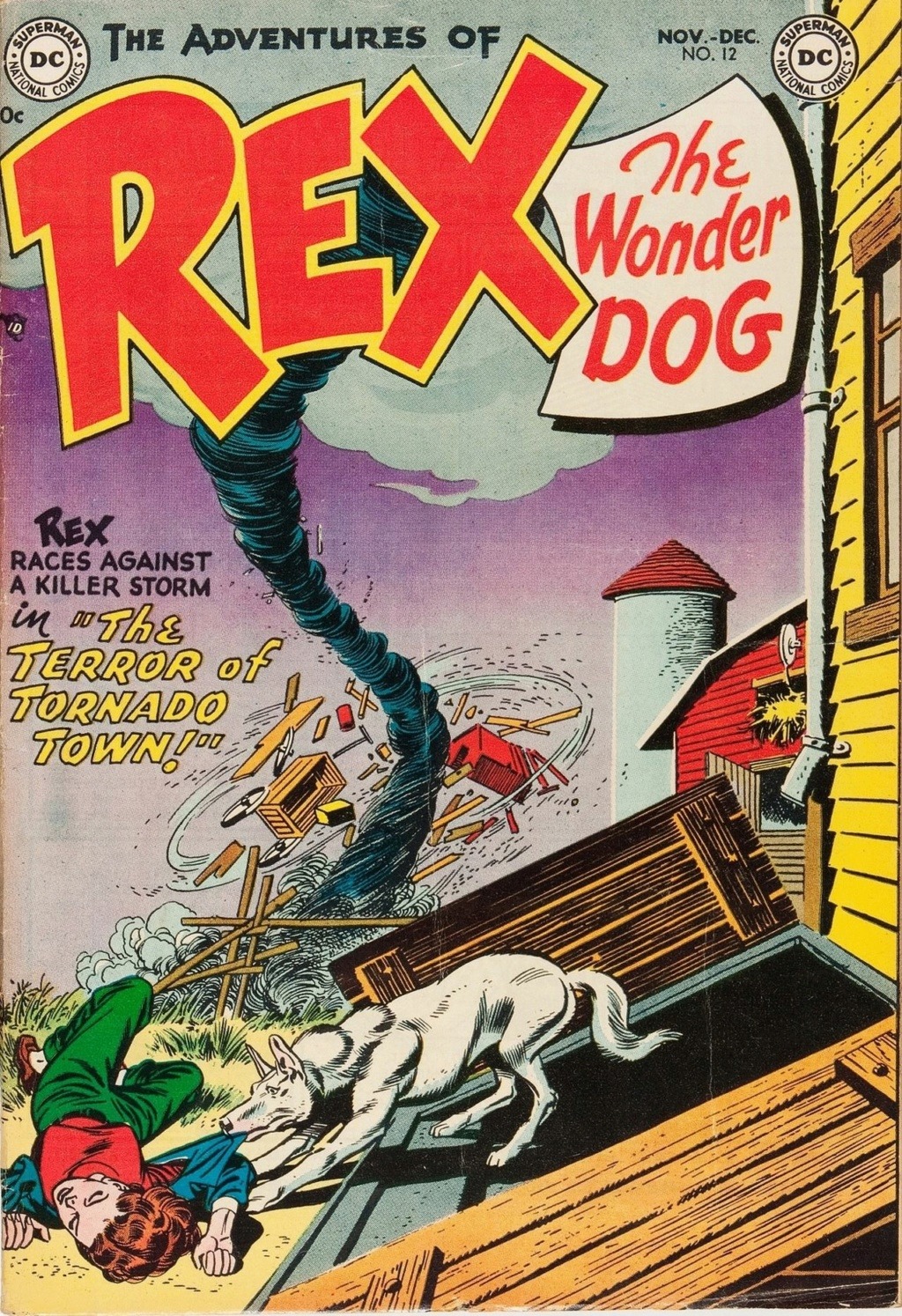




DavidMcMahon- Cosmic Level
- Posts : 8754
Join date : 2010-05-10
Age : 64
Location : Raleigh, NC, USA

DavidMcMahon- Cosmic Level
- Posts : 8754
Join date : 2010-05-10
Age : 64
Location : Raleigh, NC, USA
 Re: 1950s California
Re: 1950s California
SHEENA HAD HER OWN TV SHOW IN THE 50s, YEARS BEFORE TARZAN DID. I'VE NEVER SEEN AN EPISODE. I HEAR THAT THE COMPANY WENT BANKRUPT AND SORT OF LEFT CAST AND CREW HIGH AND DRY, AFTER THE 1ST SEASON OF THE SHOW.
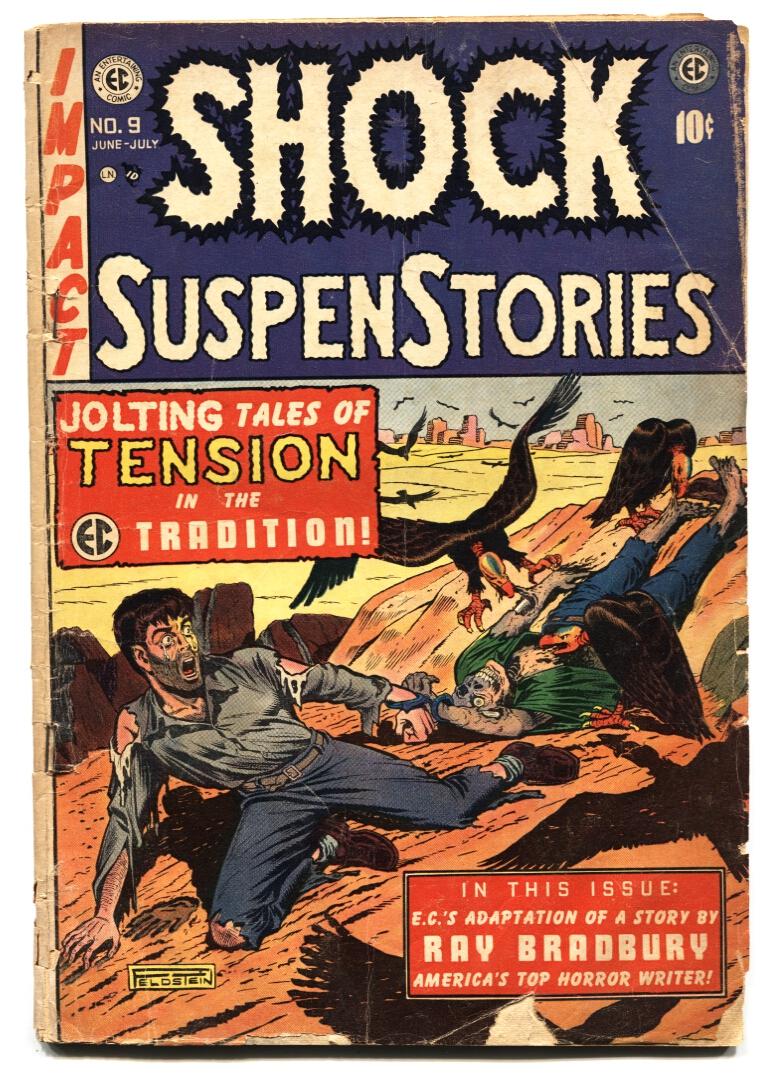
Sheena first appeared stateside in Fiction House's Jumbo Comics #1, and subsequently in every issue (Sept. 1938 – April 1953), as well as in her groundbreaking 18-issue spin-off, Sheena, Queen of the Jungle (Spring 1942 – Winter 1952), the first comic book to title-star a female character.[3] Sheena also appeared in Fiction House's Ka'a'nga #16 (Summer 1952) and the one-shot 3-D Sheena, Jungle Queen (1953)[3]—the latter reprinted by Eclipse Comics as Sheena 3-D (January 1985) and by Blackthorne Publishing as Sheena 3-D Special (May 1985). Blackthorne also published Jerry Iger's Classic Sheena (April 1985).
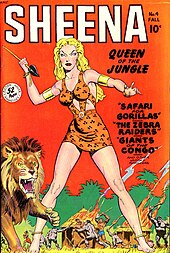
Sheena #4 (Fall 1948). Cover art by Joe Doolin
Fiction House, originally a pulp magazine publisher, ran prose stories of its star heroine in the latter-day pulp one-shot Stories of Sheena, Queen of the Jungle (Spring 1951) and Jungle Stories vol. 5 #11 (Spring 1954).[7]
According to Jess Nevins' Encyclopedia of Golden Age Superheroes, "Assisted by the great white hunter Bob Reynolds, Sheena fights everything under the sun, including but not limited to: hostile natives, hostile animals, giants, a super-ape, the Green Terror, sabre-tooth tigers, voodoo cultists, gorilla-men, devil-apes, blood cults, devil queens, dinosaurs, army ants, lion men, lost races, leopard-birds, cavemen, serpent gods, vampire-apes, etc."[9]
Originally costumed in a simple red dress, by issue #10 of Jumbo Comics Sheena acquired her iconic leopard skin outfit.[1]
In time, Sheena's home village is destroyed, leaving Sheena with a white safari guide named Bob Reynolds (alternately called "Bob Reilly" or "Bob Rayburn"), who becomes her mate.[10] In later incarnations, Sheena's mate is Rick Thorne.[1]
Model Irish McCalla portrayed the titular character in Sheena: Queen of the Jungle, a 26-episode TV series, aired in first-run syndication from 1955 to 1956.[12] McCalla told a newspaper interviewer she was discovered by Nassour Studios while throwing a bamboo spear on a Malibu, California, beach, famously adding, "I couldn't act, but I could swing through the trees."[13] Although the Sheena character was often called "the Queen of the Congo,"[citation needed] the TV series clearly located her in Kenya,[citation needed] which is hundreds of miles from the Congo River. Though the character was created in comic books by Will Eisner and Jerry Iger many years earlier, a 1956 New York Times obituary for Claude E. Lapham, a 10-year editor at Fiction House, says, "His story 'Sheena' was the basis for the television story of that name."[14]
A 1984 Columbia Pictures film, Sheena, produced by Paul Aratow starred Tanya Roberts, who had previously co-starred as Kiri in MGM's 1982 movie Beastmaster. Roberts' Sheena had a much-expanded vocabulary from McCalla's (as well as a telepathic connection with jungle animals). Marvel Comics published a comic-book adaptation of the Sheena movie as Marvel Comics Super Special #34 (June 1984), reprinting it as Sheena, Queen of the Jungle #1–2 (Dec. 1984–Feb. 1985).
The Bollywood film industry in India produced a string of uncredited Hindi versions of Sheena, beginning with Tarzan Sundari, also known as Lady Tarzan (1983); Africadalli Sheela (1986); and Jungle Ki Beti (1988).[citation needed]
Sheena was revived by TV syndicator Hearst Entertainment in October 2000, portrayed by Gena Lee Nolin. Sheena was given a new power, in this 35-episode Columbia/TriStar series: the ability to adopt the form of any warm-blooded animal once she gazed into its eyes. She was also depicted as a ferocious killer, capable of becoming a humanoid creature called the Darak'Na; this form killed numerous individuals, though in her regular form she was also seen in numerous episodes stabbing soldiers and other villains to death. As with Tanya Roberts, Nolin's Sheena spoke whole sentences.
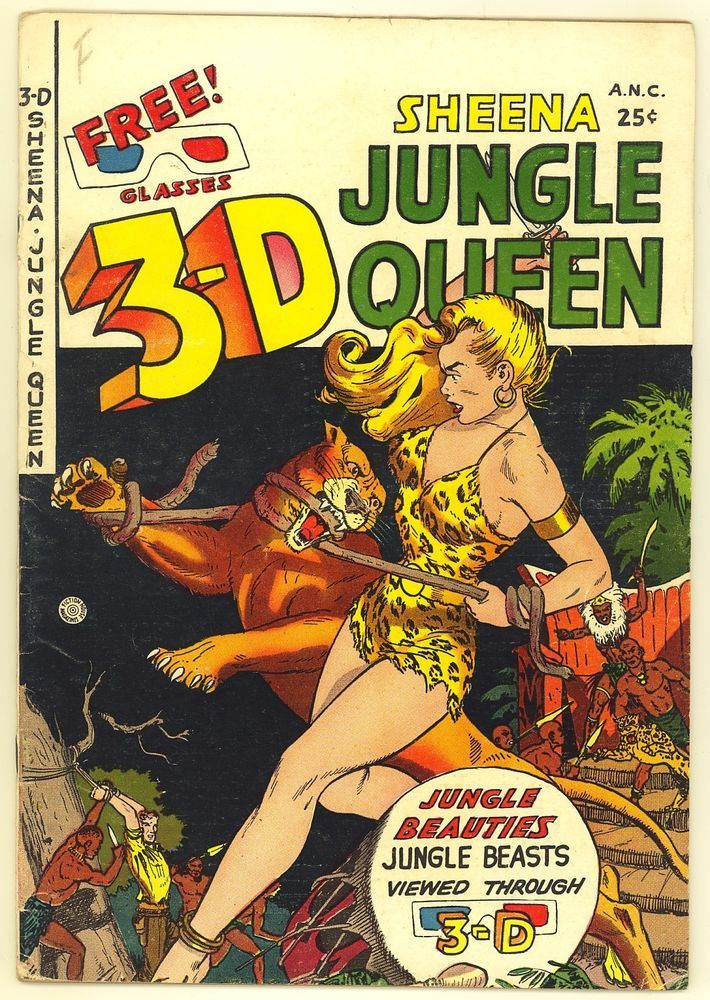
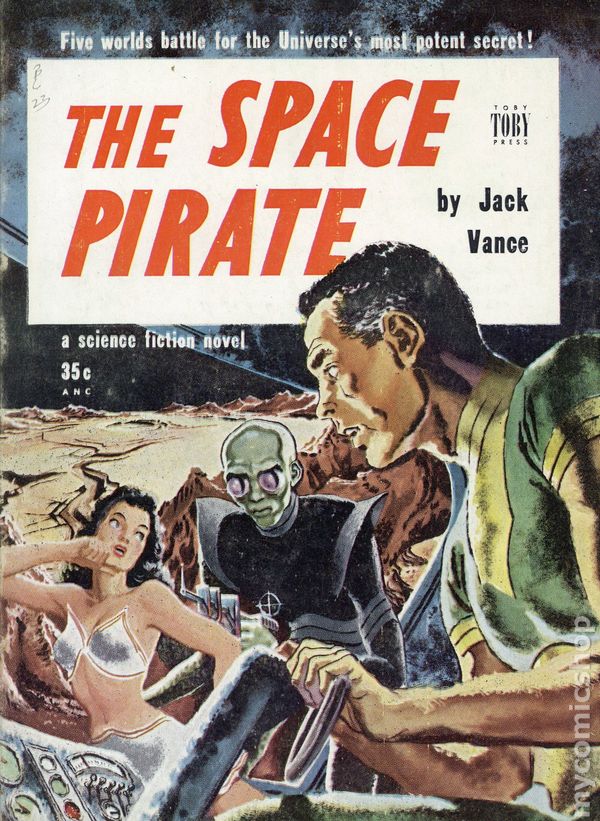

Fiction House
Sheena debuted in Joshua B. Power's British magazine Wags #1 in January 1937.[2][3] She was created by S. M. "Jerry" Iger who ran his own small studio, "Universal Phoenix Features" (UFP), and who commissioned Mort Meskin to produce prototype drawings of Sheena.[4] UFP was one of a handful of studios that produced comics on demand for publishers and syndicates, and whose client Editors Press Service distributed the feature to Wags. Saying he could no longer afford to pay Will Eisner as a freelancer, he co-founded Eisner & Iger, which continued the work of UFP, but Iger bought out Eisner when (according to Iger) Eisner went to produce propaganda for the US Army[4] but other sources say Eisner left so he could create The Spirit. To help hide the fact their studio consisted only of themselves, the duo signed their Sheena strip with the pseudonym "W. Morgan Thomas".[5] Eisner said an inspiration for the character's name was H. Rider Haggard's 1886 jungle-goddess novel She.[6]Sheena first appeared stateside in Fiction House's Jumbo Comics #1, and subsequently in every issue (Sept. 1938 – April 1953), as well as in her groundbreaking 18-issue spin-off, Sheena, Queen of the Jungle (Spring 1942 – Winter 1952), the first comic book to title-star a female character.[3] Sheena also appeared in Fiction House's Ka'a'nga #16 (Summer 1952) and the one-shot 3-D Sheena, Jungle Queen (1953)[3]—the latter reprinted by Eclipse Comics as Sheena 3-D (January 1985) and by Blackthorne Publishing as Sheena 3-D Special (May 1985). Blackthorne also published Jerry Iger's Classic Sheena (April 1985).

Sheena #4 (Fall 1948). Cover art by Joe Doolin
Fiction House, originally a pulp magazine publisher, ran prose stories of its star heroine in the latter-day pulp one-shot Stories of Sheena, Queen of the Jungle (Spring 1951) and Jungle Stories vol. 5 #11 (Spring 1954).[7]
Fictional character biography
Sheena is the young blond daughter of Cardwell Rivington, who is exploring in Africa with his daughter in tow. When Cardwell dies from accidentally drinking a magic potion made by Koba, a native witch doctor, Sheena is orphaned. Koba raises the young girl as his daughter, teaching her the ways of the jungle and various central African languages. The adult Sheena becomes "queen of the jungle" and acquires a monkey sidekick named Chim.[1]According to Jess Nevins' Encyclopedia of Golden Age Superheroes, "Assisted by the great white hunter Bob Reynolds, Sheena fights everything under the sun, including but not limited to: hostile natives, hostile animals, giants, a super-ape, the Green Terror, sabre-tooth tigers, voodoo cultists, gorilla-men, devil-apes, blood cults, devil queens, dinosaurs, army ants, lion men, lost races, leopard-birds, cavemen, serpent gods, vampire-apes, etc."[9]
Originally costumed in a simple red dress, by issue #10 of Jumbo Comics Sheena acquired her iconic leopard skin outfit.[1]
In time, Sheena's home village is destroyed, leaving Sheena with a white safari guide named Bob Reynolds (alternately called "Bob Reilly" or "Bob Rayburn"), who becomes her mate.[10] In later incarnations, Sheena's mate is Rick Thorne.[1]
Model Irish McCalla portrayed the titular character in Sheena: Queen of the Jungle, a 26-episode TV series, aired in first-run syndication from 1955 to 1956.[12] McCalla told a newspaper interviewer she was discovered by Nassour Studios while throwing a bamboo spear on a Malibu, California, beach, famously adding, "I couldn't act, but I could swing through the trees."[13] Although the Sheena character was often called "the Queen of the Congo,"[citation needed] the TV series clearly located her in Kenya,[citation needed] which is hundreds of miles from the Congo River. Though the character was created in comic books by Will Eisner and Jerry Iger many years earlier, a 1956 New York Times obituary for Claude E. Lapham, a 10-year editor at Fiction House, says, "His story 'Sheena' was the basis for the television story of that name."[14]
A 1984 Columbia Pictures film, Sheena, produced by Paul Aratow starred Tanya Roberts, who had previously co-starred as Kiri in MGM's 1982 movie Beastmaster. Roberts' Sheena had a much-expanded vocabulary from McCalla's (as well as a telepathic connection with jungle animals). Marvel Comics published a comic-book adaptation of the Sheena movie as Marvel Comics Super Special #34 (June 1984), reprinting it as Sheena, Queen of the Jungle #1–2 (Dec. 1984–Feb. 1985).
The Bollywood film industry in India produced a string of uncredited Hindi versions of Sheena, beginning with Tarzan Sundari, also known as Lady Tarzan (1983); Africadalli Sheela (1986); and Jungle Ki Beti (1988).[citation needed]
Sheena was revived by TV syndicator Hearst Entertainment in October 2000, portrayed by Gena Lee Nolin. Sheena was given a new power, in this 35-episode Columbia/TriStar series: the ability to adopt the form of any warm-blooded animal once she gazed into its eyes. She was also depicted as a ferocious killer, capable of becoming a humanoid creature called the Darak'Na; this form killed numerous individuals, though in her regular form she was also seen in numerous episodes stabbing soldiers and other villains to death. As with Tanya Roberts, Nolin's Sheena spoke whole sentences.



DavidMcMahon- Cosmic Level
- Posts : 8754
Join date : 2010-05-10
Age : 64
Location : Raleigh, NC, USA

DavidMcMahon- Cosmic Level
- Posts : 8754
Join date : 2010-05-10
Age : 64
Location : Raleigh, NC, USA

DavidMcMahon- Cosmic Level
- Posts : 8754
Join date : 2010-05-10
Age : 64
Location : Raleigh, NC, USA

DavidMcMahon- Cosmic Level
- Posts : 8754
Join date : 2010-05-10
Age : 64
Location : Raleigh, NC, USA

DavidMcMahon- Cosmic Level
- Posts : 8754
Join date : 2010-05-10
Age : 64
Location : Raleigh, NC, USA

DavidMcMahon- Cosmic Level
- Posts : 8754
Join date : 2010-05-10
Age : 64
Location : Raleigh, NC, USA

DavidMcMahon- Cosmic Level
- Posts : 8754
Join date : 2010-05-10
Age : 64
Location : Raleigh, NC, USA
 Re: 1950s California
Re: 1950s California
OK, did a bit more checking and both radio stations and TV stations West of the Mississippi River all had call signs that start with "K".
Here are a few TV stations, mostly from Los Angeles
KTLA
KCBS
KNBC
KABC
KTTV
KCET
KCOP
Here are a few TV stations, mostly from Los Angeles
KTLA
KCBS
KNBC
KABC
KTTV
KCET
KCOP

DavidMcMahon- Cosmic Level
- Posts : 8754
Join date : 2010-05-10
Age : 64
Location : Raleigh, NC, USA
Page 3 of 3 •  1, 2, 3
1, 2, 3
Permissions in this forum:
You cannot reply to topics in this forum
